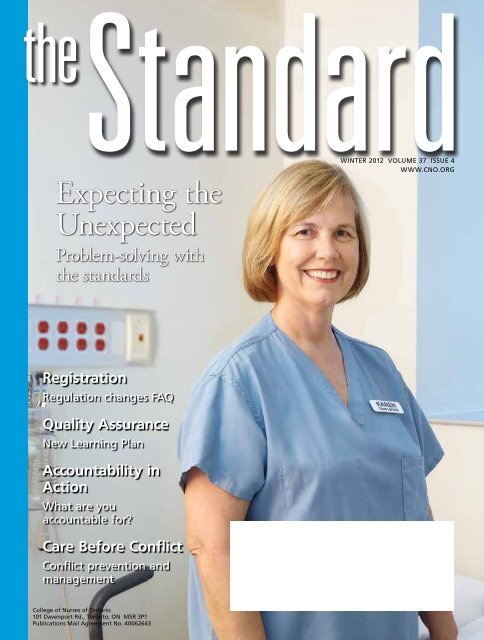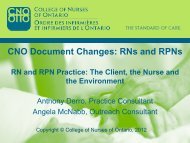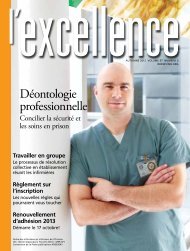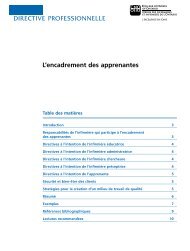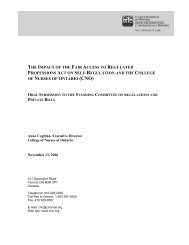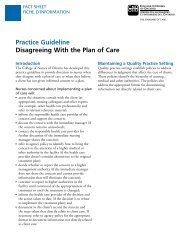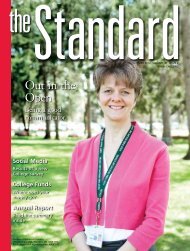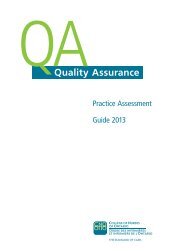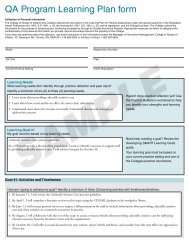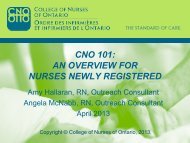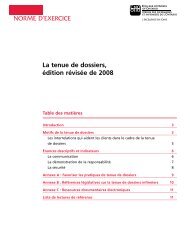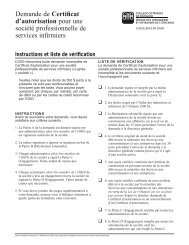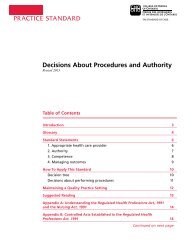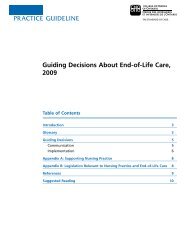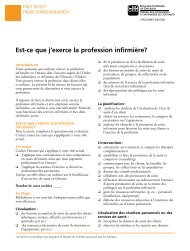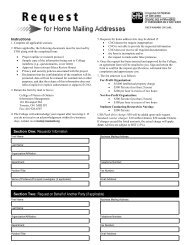The Standard, Winter 2012 - College of Nurses of Ontario
The Standard, Winter 2012 - College of Nurses of Ontario
The Standard, Winter 2012 - College of Nurses of Ontario
Create successful ePaper yourself
Turn your PDF publications into a flip-book with our unique Google optimized e-Paper software.
the<strong>Standard</strong>Expecting theUnexpectedProblem-solving withthe standardswinter <strong>2012</strong> volume 37 issue 4www.cno.orgRegistrationRegulation changes FAQQuality AssuranceNew Learning PlanAccountability inActionWhat are youaccountable for?Care Before ConflictConflict prevention andmanagement<strong>College</strong> <strong>of</strong> <strong>Nurses</strong> <strong>of</strong> <strong>Ontario</strong>101 Davenport Rd., Toronto, ON M5R 3P1Publications Mail Agreement No. 40062643
Ad removed forweb publishing
Ad removed forweb publishing
NEWSCelebrating 50 yearsIn 1963, the <strong>Ontario</strong> government grantedself-regulation to the nursing pr<strong>of</strong>essionand founded the <strong>College</strong>. “We, thepeople <strong>of</strong> the province <strong>of</strong> <strong>Ontario</strong>, havegiven you very great privileges,” said Dr.Matthew Dymond, the then-Minister<strong>of</strong> Health, speaking at the first Councilmeeting <strong>of</strong> the newly formed <strong>College</strong>in October, 1963. “But then, apparentin all privileges are very great and graveresponsibilities.”Photo: CNO archivesNewspaper articles from <strong>The</strong> Globe and Mail in March, 1963, contain interviews with thethen-Minister <strong>of</strong> Health, Dr. Matthew Dymond (inset).In 2013, the <strong>College</strong> enters its 50thyear <strong>of</strong> meeting the “great and grave”responsibility <strong>of</strong> regulating the nursingpr<strong>of</strong>ession in the public interest.with <strong>Ontario</strong>’s nurses to ensure qualitycare. You will be proud to see how your<strong>College</strong> has been a leader in regulationthroughout its history.they have come as a pr<strong>of</strong>ession. Today,nursing is a complex and challengingpr<strong>of</strong>ession consisting <strong>of</strong> well-educated,accountable and dedicated individuals.Starting in January, we will mark ouranniversary in a number <strong>of</strong> ways. Watchfor special anniversary sections in <strong>The</strong><strong>Standard</strong> and on www.cno.org. Wehave come up with creative ways toshare with the public how the <strong>College</strong>has worked — and continues to work —“Next year, the <strong>College</strong> will reflect onour past accomplishments in the field <strong>of</strong>pr<strong>of</strong>essional regulation, while continuingour work in support <strong>of</strong> the publicinterest,” says Anne Coghlan, RN, the<strong>College</strong>’s Executive Director and CEO.“<strong>Nurses</strong> should also consider how far“Through the collective efforts <strong>of</strong> the<strong>College</strong> and our members over thepast five decades, we have earned andmaintained the public’s trust in nursing.We can truly take pride in our past andhave confidence in our future!” SNew Outreach sectorTo connect with nurses who are newlyregistered, the <strong>College</strong> has added a newsector to its Outreach Program.<strong>The</strong> “<strong>Nurses</strong> Newly Registered”sector will provide support to nurseswithin their first two years afterregistering with the <strong>College</strong>. <strong>The</strong>se nursesmay be new graduates or nurses new to<strong>Ontario</strong>, either from other provinces oreducated internationally.<strong>The</strong> Outreach Program is the<strong>College</strong>’s main method for reaching outto nurses who work in specific settings.Outreach Consultants are available tohelp nurses apply <strong>College</strong> standards totheir practice. (Visit www.cno.org/outreach for more information aboutthe program.)“At this time, we are speakingwith key stakeholders to find out thechallenges faced by nurses who arenewly registered,” says Amy Hallaran,RN, the Outreach Consultant for the newsector. “Our next plan is to hold focusgroups at the beginning <strong>of</strong> 2013.”If you are a nurse who meets thedescription <strong>of</strong> this new sector, then youare invited to participate in these focusgroups. Starting January 2013, you canapply to participate by completing anapplication form at www.cno.org/volunteer.For questions about the <strong>Nurses</strong>Newly Registered sector, contact AmyHallaran at ahallaran@cnomail.org. S8 <strong>College</strong> <strong>of</strong> <strong>Nurses</strong> <strong>of</strong> <strong>Ontario</strong> the standard winter <strong>2012</strong>
news You can useImportant dates forsuspended members<strong>The</strong> <strong>College</strong>’s Registration Regulationsets out conditions that all members areaccountable for meeting on an ongoingbasis to maintain registration.Changes to the regulation that are setto take effect on Jan. 1, 2013, will affectmembers who are suspended for failingto pay fees or provide information to the<strong>College</strong>.Under the new regulation:■members will have to complete theAnnual Membership Renewal form andpay all required fees by Feb. 14, 2013.Those who do not complete bothactions by that date will be suspended.■Suspended members will have untilMarch 17, 2013, to renew theirmembership and pay outstanding fees,or to resign from the <strong>College</strong>.■Suspended members who have notcompleted either action by thatdate will have their certificates <strong>of</strong>registration revoked.■Individuals with revoked certificates willhave to request reinstatement if theywish to return to nursing in <strong>Ontario</strong>.<strong>The</strong> revised regulation affects allsuspended members, regardless <strong>of</strong>when their suspension took effect.If you are currently practising, visitwww.cno.org/mym to renew byFeb. 14, 2013, to avoid the suspensionand possible revocation <strong>of</strong> yourcertificate.For more information on the RegistrationRegulation, see page 14. SCorrectionIn the Fall <strong>2012</strong> issue,the News article on thejurisprudence exam (p. 9)should have read: “Formermembers wishing toreinstate their membershipwill also be required to passthe examination if theylast held a certificate withthe <strong>College</strong> more than fiveyears ago.”Council meetings<strong>The</strong> draft minutes <strong>of</strong> theDecember Council meetingwill be posted atwww.cno.org/agendasin January.Council meetings are open tothe public. To attend, contactJenna H<strong>of</strong>bauer, CouncilAffairs Coordinator, at416 928-0900, ext. 7566;1 800 387-5526, ext. 7566(toll-free in <strong>Ontario</strong>); orjh<strong>of</strong>bauer@cnomail.org.Ad removed forweb publishingUpcoming meetings:March 7, 2013June 6, 2013Sept. 19, 2013Dec. 5, 2013For more information onCouncil, visitwww.cno.org/council.<strong>College</strong> <strong>of</strong> <strong>Nurses</strong> <strong>of</strong> <strong>Ontario</strong> the standard winter <strong>2012</strong>9
Photo: SwavekKaren Connor, RN, atthe Quinte Health CarePrince Edward CountyMemorial Hospital.
Featuresupports such as teleconferences and learning modules,and by participating in the <strong>College</strong>’s QA (QualityAssurance) program. <strong>The</strong>se resources equip them foreveryday practice and unexpected challenges.Participating in the QA Program will help you keep thestandards fresh in your mind as you use them to reflect onyour practice and set goals for improvements. For example,reviewing and reflecting on the Ethics practice document,and discussing the content and scenarios with yourcolleagues, can give you a deeper understanding <strong>of</strong> howthe standard applies in a variety <strong>of</strong> situations.To be prepared isto be proactive andanticipate possiblechallenges, and planaccordingly.To be prepared is to be proactive and anticipatepossible challenges, and plan accordingly. This couldmean collaborating with colleagues to find solutionsto anticipated challenges, creating a scenario-basedpreparedness plan for possible demanding situations or,when necessary, advocating for changes to policies thataffect the practice setting. Being proactive could alsomean sharpening skills and knowledge by participating inongoing learning and consulting with experts.“A secret to being proactive lies in critical thinking,”says Karen Connor, RN, a team leader in the ED(emergency department) at the Quinte Health Care PrinceEdward County Memorial Hospital.Critical thinking involves evaluating and reflectingon facts or a situation, to decide the best actions to take.Connor and her team have been using their judgmentand critical-thinking skills since being faced with theintravenous medication shortage in the Canadian healthcare industry. “Our strongest strategy is that we work as ateam with the pharmacy and doctors,” she says.<strong>The</strong> nurses created a list <strong>of</strong> medications that werecritical to the ED and shared it with the pharmacy. “Sincenurses are the ones who administer medication, we are ina position to know when conservation strategies have to beused because supply is running low,” says Connor.She encourages the nurses to speak up when a physicianwants to prescribe intravenous medication to a client whois able to tolerate an oral form <strong>of</strong> the medication.“<strong>The</strong>se strategies are good examples <strong>of</strong> nurses usingtheir judgment and critical-thinking skills to manage achallenging situation,” says Adler.While developing and using strategies to managechallenges, nurses must always be conscious <strong>of</strong> applyingthe practice standards because they provide the legal andpr<strong>of</strong>essional foundation for nursing practice. In Connor’sexample above, even when using conservation strategies tomanage a shortage, nurses must still follow the principles<strong>of</strong> the Medication, Revised 2008 practice document. Thisincludes ensuring that one nurse performs all the steps <strong>of</strong>the administration process, and obtaining a new supply <strong>of</strong>medication if there are concerns about how the medicationhas been maintained.Develop problem-solving skillsIn any practice setting, it can be stressful to keep up withthe demand when the complexity <strong>of</strong> the client populationchanges quickly. Picture a unit where clients receive carefrom both RPNs and RNs. One day, the nurses in theunit find that the complexity <strong>of</strong> many <strong>of</strong> the clients hasincreased significantly. How can the nurses manage thissituation while still following the <strong>College</strong>’s standards?<strong>The</strong> <strong>College</strong> suggests nurses work together to decidewho to assign care to, and when consultation wouldhelp. <strong>The</strong> <strong>College</strong>’s practice document, RN and RPNPractice: <strong>The</strong> Client, the Nurse and the Environment, usesa three-factor framework to help nurses make decisionsabout care-provider assignment, and consulting andcollaborating with care providers.“Although this is a stressful situation because <strong>of</strong> thesudden increase in the percentage <strong>of</strong> clients with morecomplex care needs, nurses should still uphold theprinciples <strong>of</strong> the three-factor framework,” explains Derro.“If an RPN finds that her client’s care needs suddenlychanged from less complex to moderately complex, theRPN will likely need to consult with an RN and maybeeven transfer some aspects <strong>of</strong> care to the RN. <strong>The</strong> keyis to work together to best meet the clients’ needs, whileensuring that the standards <strong>of</strong> practice are maintained atall times.”It is also important to critically analyze the situation andfind ways to make the best <strong>of</strong> staff resources on hand. Forexample, when it is not appropriate for an RPN to providesome clients’ total care, the RPN may have the knowledge,12 <strong>College</strong> <strong>of</strong> <strong>Nurses</strong> <strong>of</strong> <strong>Ontario</strong> the standard winter <strong>2012</strong>
QaCheck out the new Learning Plan in early 2013.Visit www.cno.org/qa and go to myQA.Read the article on page 16 to find out more.ProgramRenewal 2013Renewal deadline:MondayDec. 31, <strong>2012</strong>All nurses are required to renewonline for 2013.Visit www.cno.org/mym.
FeatureAccountabilityin ActionScenarios show how standardscome aliveYou’re walking by a room, in the middle <strong>of</strong> a typicallybusy day, and you happen to hear a fellow nurse usingverbally abusive language with a client. Do you stop?What do you say?“As a nurse, you’re accountable for maintaining thepublic’s confidence in individual nurses and in thepr<strong>of</strong>ession,” says Karen Puckrin, RN, Manager <strong>of</strong> Reports.“To continue to deserve this confidence, nurses have aduty to uphold the standards <strong>of</strong> the pr<strong>of</strong>ession and toconduct themselves in a manner that reflects well on thepr<strong>of</strong>ession.”Accountability is a thread that connects every situationnurses face daily. It differs from responsibility (see sidebaron page 19). Think about how you would respond in thefollowing four scenarios — and what accountability reallymeans in practice.Introduce yourself<strong>Nurses</strong> manage a variety <strong>of</strong> relationships every day:relationships with colleagues, other health care teammembers, employers and clients. At the outset, thetherapeutic nurse-client relationship is one <strong>of</strong> the mostbasic accountabilities.Picture a client visiting a community clinic. Followingcheck-in, the client is escorted to the examination room bya woman the client assumes is the administrative assistant.<strong>The</strong> woman states that the doctor will be in shortly andsays nothing about her role. Later, the same womanre-enters the room and, without introducing herself,prepares to administer a vaccination to the puzzled client.<strong>The</strong> woman in this case is a nurse. However, withoutproperly introducing herself, the client thought she wasan administrative assistant. “Stating your full name, your18 <strong>College</strong> <strong>of</strong> <strong>Nurses</strong> <strong>of</strong> <strong>Ontario</strong> the standard winter <strong>2012</strong>
Featurepr<strong>of</strong>essional designation (RN, RPN or NP) and what youare about to do gives the client the opportunity to consentto treatment, to clarify what is about to happen and whois going to do it,” says Angela McNabb, RN, OutreachConsultant for the mental health/corrections and complexcontinuing care/rehabilitation sectors.<strong>Nurses</strong> are accountable for identifying themselves andexplaining their role. Failing to do so at the beginning <strong>of</strong>the therapeutic nurse-client relationship is among the morecommon issues raised in complaints and reports to the<strong>College</strong>.Why is identification such an essential part <strong>of</strong>accountability? It speaks to your authority and to informedconsent. With so many categories <strong>of</strong> health care providers,clients can’t be expected to know who is who, addsBarbara Czerniawski, RN, Outreach Consultant for thepaediatrics and academic sectors. “You don’t want clientsmistakenly believing that a personal support worker or anunregulated care provider, for instance, is a nurse. You alsodon’t want anyone who isn’t a nurse to use the protectedtitle.”“<strong>The</strong> bigger picture is about maintaining publicconfidence,” elaborates Puckrin. “If a client understandsthat you’re a nurse, they can assume that you have theknowledge, skill and judgment to perform a controlled act.<strong>The</strong> second part is that if the <strong>College</strong>’s members alwaysidentify themselves, the public can feel confident that theyare receiving care from a regulated pr<strong>of</strong>essional.”Advocate for the clientNo form <strong>of</strong> abuse is acceptable. <strong>Nurses</strong> are accountable foradvocating for clients even when they don’t provide themwith direct care. <strong>Nurses</strong> must also recognize the potentialfor client abuse, prevent abuse when possible and takeaction to stop it.What if you witness a fellow nurse aggressively shoutingat her client to stop ringing the call bell? <strong>The</strong> first step inintervening is to remove the nurse from the situation; askto speak privately, outside the room. You could <strong>of</strong>fer theother nurse an opportunity for an explanation, but be sureto provide feedback: you overheard what was said and itdidn’t sound like an appropriate way to interact.What’s your next step? McNabb says you areaccountable for reporting abuse if you see evidence thatyour colleague will not modify their behaviour. Pr<strong>of</strong>essional<strong>Standard</strong>s, Revised 2002 requires nurses to report to theappropriate authority “any health care team member orcolleague whose actions or behaviours toward clients areunsafe or unpr<strong>of</strong>essional.” This includes verbal abuse.In a situation like this, it can be easy to diminish theAccountability vs.responsibilityWhat’s the difference between responsibilityand accountability? <strong>The</strong> terms are <strong>of</strong>tenused interchangeably. <strong>The</strong> dictionary definesresponsibility in part as being accountable, andaccountability in part as being responsible — nohelp there. Yet when it comes to being anurse, there is a distinction.Pr<strong>of</strong>essional <strong>Standard</strong>s says: “Each nurse isaccountable to the public and responsible forensuring that her/his practice and conductmeets legislative requirements and thestandards <strong>of</strong> the pr<strong>of</strong>ession.“<strong>Nurses</strong> are responsible for their actions andthe consequences <strong>of</strong> those actions. <strong>The</strong>y’re alsoaccountable for conducting themselves in waysthat promote respect for the pr<strong>of</strong>ession.”Is it a matter <strong>of</strong> semantics? Not at all, saysKaren Puckrin, RN, Manager <strong>of</strong> Reports. It’sall part <strong>of</strong> being a regulated pr<strong>of</strong>essional.<strong>Nurses</strong>, like everyone, have everyday jobresponsibilities. “But we have an accountabilitybeyond the job or employer,” Puckrin explains.It’s an accountability to the <strong>College</strong>, to thepublic and to supporting the public’s belief insafe nursing practice.Here’s one way <strong>of</strong> looking at it: at work, we’reall responsible for something; nurses are alsoaccountable to something.<strong>College</strong> <strong>of</strong> <strong>Nurses</strong> <strong>of</strong> <strong>Ontario</strong> the standard winter <strong>2012</strong>19
Featureincident or rationalize away the right thing to do: <strong>The</strong>client must have been challenging. I don’t want to get acolleague in trouble. Reporting what happened will affectmy working relationship with the other nurse. You mightbelieve the incident was isolated, but it is possible that it’shappened in the past, even if you haven’t seen it before.<strong>The</strong> verbal abuse could be part <strong>of</strong> a pattern, and yoursupervisor might already be aware <strong>of</strong> other occurrences.Czerniawski clarifies the situation: “You’re accountablefor addressing the other nurse’s behaviour and for takingaction to protect the client.” To read how nurses candemonstrate accountability in their practice, see thesidebar below.For more information on preventing abuse, see the<strong>College</strong>’s abuse-prevention program, One is One Too Many,at www.cno.org/one.“Minor” error, deeper issuesHow do you protect the client when the harm is onlypotential? For example, a nurse makes a medication errorthat seems so harmless she decides not to do anythingabout it. You learn about the incident. This nurse is afriend and you socialize together outside <strong>of</strong> the workplace.What do you do?That the error might seem minor is irrelevant,Czerniawski says. According to the Medication, Revised2008 practice document, nurses are accountable forreporting all errors and near misses using formal practicesettingcommunication mechanisms.While the nurse who made the error might feel likeno harm was done and that it’s not worth the effort tomake a report, she is obligated to do so nevertheless. Andby becoming aware <strong>of</strong> what happened, you are equallyaccountable for ensuring that a report is made. Start bytalking to the nurse. “Discuss why she thought it wasnot important,” suggests McNabb. “Is there a knowledgegap about what’s to be done for medication errors or nearmisses?”Larger systemic issues could be at play, too. Maybe thisisn’t the first time such an error has occurred with thesame medication. That could signify that changes need tobe made to a process, a procedure or labelling. “If it’s notreported, there’s no way the organization can know what’sgoing on and prevent the chance <strong>of</strong> further errors,” saysCzerniawski.<strong>The</strong> <strong>College</strong> does not require or desire employers toreport every medication error, says Puckrin. (Reportingcontinued on page 46Demonstrating accountability■Identify yourself and explain your role to clients.■Provide, facilitate, advocate and promote the best possible care for clients.■Advocate on behalf <strong>of</strong> clients.■Seek assistance appropriately and in a timely manner.■Share nursing knowledge and expertise with others to meet client needs.■Ensure practice is consistent with the <strong>College</strong>’s standards <strong>of</strong> practice and guidelines, as well aslegislation.■Take action when client safety and well-being are compromised.■Maintain competence and don’t perform activities you aren’t competent in.■Take responsibility for errors when they occur and take appropriate action to maintain client safety.■Report to the appropriate authority any health care team member or colleague whose actions orbehaviours toward clients are unsafe or unpr<strong>of</strong>essional, or that indicate physical, verbal or emotionalabuse.■Report sexual abuse <strong>of</strong> a client by a regulated health pr<strong>of</strong>essional to the appropriate regulatorycollege, as legislated in the Regulated Health Pr<strong>of</strong>essions Act, 1991.From Pr<strong>of</strong>essional <strong>Standard</strong>s, Revised 2002.20 <strong>College</strong> <strong>of</strong> <strong>Nurses</strong> <strong>of</strong> <strong>Ontario</strong> the standard winter <strong>2012</strong>
getInvolvedBe part <strong>of</strong> Council!■ Shape the future <strong>of</strong> nursing practice■ Support nurses in providingquality care■ Participate in decision-making about<strong>College</strong> policies and programsto facilitate quality nursing careEmbrace your pr<strong>of</strong>essionalaccountabilityParticipate innursing regulationSubmit your name to stand for election ornominate a colleague.Nomination forms are included with thisissue <strong>of</strong> <strong>The</strong> <strong>Standard</strong> and are available atwww.cno.org/elections.Nominations are due by Jan. 11, 2013.RNs and RPNs from theCentral Easternelectoral district.Want to learn more about our elections?Visit: www.cno.org/electionsEmail: jh<strong>of</strong>bauer@cnomail.orgContact: Jenna H<strong>of</strong>bauer, Council Affairs CoordinatorTel.: 416 928-0900, ext. 7566Toll-free in <strong>Ontario</strong>: 1 800 387-5526, ext. 7566RNs from theCentralTorontoelectoral districts.
FeatureCare BeforeConflictWhen conflict arises, clientwell-being can be affectedIn a pr<strong>of</strong>ession such as nursing, high-pressure situationscan lead to conflict between colleagues. When conflict isleft unresolved or escalates, it can negatively affect clientcare. If this happens, nurses are accountable for findingways to resolve conflict and focus their attention onmeeting clients’ needs.“Dealing with conflict promptly and appropriatelyis important,” says Christine McLellan, RN, a clinicalmanager in the mental health and addictions programat Grand River Hospital in Kitchener. “Too <strong>of</strong>ten, wedon’t deal with conflict in a timely way because it takesa certain amount <strong>of</strong> resolve to address a situation afterthe fact. It is easier to just ‘let it go’ — but the next timethere is an issue, there is a higher risk <strong>of</strong> an overreaction.Dealing with conflict immediately minimizes the amount<strong>of</strong> time and energy spent on an issue, allowing you tomove forward in a positive way and keep the focus onpatient care.”Nursing is a pr<strong>of</strong>ession based on collaborativerelationships. However, as Evelyn Wilson, RN, the healthcare manager at the Hamilton-Wentworth DetentionCentre, points out, “there is no rule that says all staff haveto like each other. But nurses need to ensure that theyincorporate the <strong>College</strong>’s standards and guidelines aboutconflict prevention and ethics into their interactions withcolleagues.” (For more detailed information about NPsworking with physicians, see the sidebar on page 24.)22 <strong>College</strong> <strong>of</strong> <strong>Nurses</strong> <strong>of</strong> <strong>Ontario</strong> the standard winter <strong>2012</strong>
FeatureOpen communicationIn the <strong>College</strong>’s Conflict Prevention and Managementpractice document, conflict is defined as “a power strugglein which a person intends to harass, neutralize, injure oreliminate a rival.” In nursing, such power struggles canemerge from a number <strong>of</strong> situations, such as disagreeingabout a plan <strong>of</strong> care or prioritizing work differently.In both McLellan’s and Wilson’s experience, lack <strong>of</strong>communication is at the root <strong>of</strong> most conflict. Opencommunication, and an atmosphere <strong>of</strong> mutual acceptanceand understanding among colleagues, can reduce thelikelihood <strong>of</strong> serious conflict. As managers, McLellanand Wilson also have a responsibility to support such anatmosphere.“Nursing leaders need to foster an environment inwhich staff feel comfortable enough to ask them forsupport or advice,” says McLellan. “<strong>Nurses</strong> in leadershiproles can facilitate effective teamwork by keeping everyoneaware <strong>of</strong> the needs shift-to-shift, renegotiating workloadsand providing forums for discussion.”“A manager who is attuned to her team can beinstrumental in limiting conflict,” agrees Wilson. “Givingnurses the time to express concerns — whether one-on-oneor in a group — can help limit conflict. Organizing teambuildingexercises and acknowledging when issues arebeing handled well can be helpful, even for a team that isfunctioning well together.”Angela McNabb, RN, the Outreach Consultant for themental health/corrections and complex continuing care/rehabilitation sectors, emphasizes that individual nursesmust take responsibility for themselves and the ways theyrespond to conflict. “<strong>Nurses</strong> can either own their role in aconflict and do something to address it, or they can denythere is a problem, which will eventually affect client care,”she says. “<strong>Nurses</strong> aren’t responsible for another’s attitude,but they are accountable for how they respond to it.”In Wilson’s practice setting, a prison, “nursing can bea challenge because health care is not the focus <strong>of</strong> thebuilding,” she explains. “In many cases, the conflict thatarises isn’t between nurses; it involves conflicting prioritiesbetween nurses and corrections staff. In these situations,the nurses rely on each other for support, seekingaffirmation from each other that their assessments areaccurate and their care plans are appropriate.”Remaining pr<strong>of</strong>essionalPart <strong>of</strong> every nurse’s role is to advocate on behalf <strong>of</strong>clients. This can mean intervening in situations <strong>of</strong> conflictbetween colleagues that are negatively affecting teamcohesiveness or the care clients receive. “If the conflict istaking the focus away from providing care to clients, it isappropriate for a colleague to point out that patient needsare not being met and that the issue should be resolved ata more appropriate time,” says McLellan.AddsWilson: “Aslong as theconversationremainspr<strong>of</strong>essionaland focusedon the topic <strong>of</strong>the conflict,there probablyisn’t any reasonto intervene.But if theconversationstarts to turnunpr<strong>of</strong>essionalor personal,the partiesneed to stepback. Anintervention“<strong>Nurses</strong> aren’tresponsible foranother’s attitude,but they areaccountable forhow they respondto it.”by the manager, charge nurse or a colleague could steer thefocus back to the original issue.”Clients’ well-being can be negatively affected if conflictescalates or isn’t resolved in a pr<strong>of</strong>essional manner. If clientswitness conflict among their caregivers, then “trust andtherapeutic nurse-client relationships can be jeopardized,”says McLellan. “Clients expect us to behave pr<strong>of</strong>essionallyand to be able to resolve issues so the care they receive isnot affected. If staff are not communicating effectively,important information about the client might not beshared, and the standards <strong>of</strong> care might not be met.”<strong>The</strong> <strong>College</strong> has resources available for nurses dealingwith conflict. <strong>The</strong> Conflict Prevention and Management,Ethics and Pr<strong>of</strong>essional <strong>Standard</strong>s, Revised 2002 documentscontain useful information, and online learning modulesrelated to ethics and the pr<strong>of</strong>essional standards can beaccessed at www.cno.org/modules at any time.In Wilson’s practice setting, the Ministry <strong>of</strong>Community Safety and Correctional Services has policiesand procedures for handling workplace conflict. “<strong>The</strong>reare advisers to consult with and an orientation for newemployees that addresses how to deal with conflict,” shesays. “We have personnel who are trained in conflictmediation.”continued on page 24<strong>College</strong> <strong>of</strong> <strong>Nurses</strong> <strong>of</strong> <strong>Ontario</strong> the standard winter <strong>2012</strong>23
FeaturePositive outcomesConflict that has been addressed appropriately can leadnot only to personal and pr<strong>of</strong>essional growth, but to betterrelationships between colleagues as well.McLellan recalls a time when an issue with a colleagueended positively. “I was asked by a senior nurse todocument a treatment plan that was decided upon atteam rounds that day, which I had been unable to attend,”McLellan recalls. “<strong>The</strong> senior nurse provided me with asummary <strong>of</strong> the discussion and the plan, but I did not feelcomfortable completing the documentation since I had notbeen present. I declined and explained my reasons. Later,the senior nurse told our supervisor that I was not workingin the spirit <strong>of</strong> the team.”Conflict that has beenaddressed appropriatelycan lead not only topersonal and pr<strong>of</strong>essionalgrowth, but to betterrelationships betweencolleagues as well.When she followed up with her supervisor, McLellanlearned that the supervisor did not know she hadn’tattended the team rounds and agreed that McLellanwas right to refuse to document. “<strong>The</strong> senior nurse laterexplained to me how overwhelmed she felt with her ownworkload that day,” says McLellan. “We had a gooddiscussion and walked away with a better understanding<strong>of</strong> each other.”But what if two colleagues just don’t like each other?“This can be challenging,” admits McLellan. “But I’vefound that staff are usually willing to sit down anddiscuss their thoughts. Even if everyone doesn’t agreein the end, people tend to leave with a renewed sense<strong>of</strong> commitment to remaining pr<strong>of</strong>essional and puttingpersonal differences aside.NPs and physiciansBecause NPs and physicians have scopes <strong>of</strong>practice that overlap, they can have similaraccountabilities in the client’s care. This canmake it tricky to settle differences about a plan<strong>of</strong> care.“NPs and physicians should work togetherto develop an understanding <strong>of</strong> theirrespective roles on the health care team.Written agreements can help,” explains RolaMoghabghab, NP, an Advanced PracticeConsultant at the <strong>College</strong>. “Because NPs andphysicians have similar authorities to diagnoseand prescribe, conflict can be avoided byensuring there is clarity — in advance — aboutroles and resolving disagreements.” Providinga solid rationale for the client’s care andsupporting evidence can help you share yourperspective in an objective way.“As the Nurse Practitioner practice documentstates, NPs must work with others, includingthe client and other health team members,to establish a common understanding <strong>of</strong>the desired outcomes <strong>of</strong> the treatment,how information will be communicatedand how the team will work together,” saysMoghabghab. “Any agreements about howconflict on the team will be resolved, like therest <strong>of</strong> the care plan, must put the client’s bestinterests first.”“<strong>Nurses</strong> have to remember that patients are the priority,and that their needs are met when we respect each otherpr<strong>of</strong>essionally, and make a genuine effort to understandothers’ perspectives.” SHave a comment about this article?Send an email to editor@cnomail.org.24 <strong>College</strong> <strong>of</strong> <strong>Nurses</strong> <strong>of</strong> <strong>Ontario</strong> the standard winter <strong>2012</strong>
ToolsTo LearnToolsTo succeed<strong>Nurses</strong> use a lot <strong>of</strong> tools in theirLearning ModulesOnline self-study sessions for reviewingpractice standards.Go nowAsk PracticeQuestions from nurses, answeredby nurses.Go nowTeleconferencesinteractive forums on importantnursing issues.Go nowAbuse Preventionvideos and study materials onstopping abuse.Go nowday-to-day practice, but perhapsnone is more important than theirability to learn.That’s why the <strong>College</strong> <strong>of</strong>fers avariety <strong>of</strong> educational tools to helpnurses better understand and testtheir knowledge <strong>of</strong> the practicedocuments.Visit www.cno.org/learning today
QuizQuiz questions arebased on queriesto the <strong>College</strong>; realnames have notQuiz:Confidentiality and Privacybeen used.<strong>Nurses</strong> are ethicallyand legallyresponsible formaintaining theconfidentiality andprivacy <strong>of</strong> clienthealth informationobtained whileproviding care.1Rocco, an RN, practises in theorthopaedic unit <strong>of</strong> a community hospital.Last week, his father was admitted to thehospital’s oncology ward. Rocco is unable toattend the treatment team’s meeting about hisfather’s progress, even though his father wouldlike him to be there. During his next scheduledshift, Rocco considers retrieving his father’smedical record on the hospital computer.Should Rocco read his father’s chart?Yes As an RN, Rocco is authorized to access allclient records.No Rocco doesn’t have a pr<strong>of</strong>essionalpurpose for accessing the record.2Tony had a heart attack last year. Today,he has an appointment with Lucy, anNP in private practice, to discuss the results<strong>of</strong> his blood work. <strong>The</strong> results reveal thatTony’s cholesterol and glucose levels have risensignificantly. Tony confesses to Lucy that hestopped taking his medications because theymade him feel sick. Lucy would like to shareall <strong>of</strong> this information with Tony’s cardiologistas she believes it is necessary for providing care.However, Tony says he doesn’t want to tell thecardiologist about stopping the medications.Should Lucy tell Tony’s cardiologist all <strong>of</strong> theinformation?Yes <strong>The</strong> cardiologist is in the circle <strong>of</strong> careso he is entitled to know all the client’spersonal health information.No Tony can refuse disclosure <strong>of</strong> theinformation to other members <strong>of</strong> the healthcare team.3Bianca is a nurse at an elementary school.Today, she has a meeting with a student,Neve, and her mother, about Neve’s diabetes.On examining Neve, Bianca finds what appearto be cigarette burns on her abdomen. Whenasked about the burns, Neve replies, “SometimesDaddy gets mad at me.” Bianca suspects thatNeve is being abused and tells her mother thatshe will need to report her finding. Neve’smother says, “You can’t! I’m her mother and youdon’t have my permission. And who knows whatmy husband will do if he finds out we let yousee the burns.”Does a nurse need consent to report suspectedabuse <strong>of</strong> a minor?Yes <strong>The</strong> child’s legal guardian must consentto disclose personal health informationoutside the circle <strong>of</strong> care.No All health care pr<strong>of</strong>essionals must reportsuspected child abuse.4Ben, an RPN practising in a long-termcare home, is assigned to the care <strong>of</strong>Xavier. Xavier has asked Ben not to share any<strong>of</strong> his health information with his wife. Today,Xavier’s wife asks Ben for the most recentlab results. Ben tells her that he doesn’t haveXavier’s consent to disclose them. She becomesangry and says that as Xavier’s wife, she doesn’tneed consent.Can Ben share health information with Xavier’swife?Yes A spouse doesn’t require consent fromthe client.No Xavier has stated that he doesn’t want toshare this information with his wife.Answers on page 2926 <strong>College</strong> <strong>of</strong> <strong>Nurses</strong> <strong>of</strong> <strong>Ontario</strong> the standard winter <strong>2012</strong>
Ad removed forweb publishing
Ad removed forweb publishing
QuizQuiz answers from page 261No Even though his father wants him to beincluded, Rocco should not access his father’s recordsince he is not pr<strong>of</strong>essionally involved in his father’s care.PHIPA (the Personal Health Information Protection Act,2004) permits the sharing <strong>of</strong> personal health informationamong members <strong>of</strong> the health care team. Just becauseRocco has access to the health records on the hospitalcomputer doesn’t mean that it is appropriate to retrievethem. Because Rocco’s father consents to having Roccoaccess his records, Rocco could work with the health careteam to set up appropriate access to the information.Rocco should review his organization’s policy aboutconfidentiality and privacy and the legislative requirements<strong>of</strong> PHIPA. <strong>Nurses</strong> need to work with employers tocreate environments that support quality practice. Thisincludes developing processes to support nursing practiceand services related to the confidentiality and privacy <strong>of</strong>personal health information.<strong>Ontario</strong>’s privacy legislation, PHIPA, is the basis forthe <strong>College</strong>’s standards on nursing accountabilities aboutpersonal health information. For more, read Confidentialityand Privacy — Personal Health Information atwww.cno.org/docs.2No Clients have the right not to share part <strong>of</strong> theirpersonal health information with another member <strong>of</strong>the health care team. A client’s right to instruct a healthcare provider not to disclose specific health informationto other health care providers is called the “lockboxprovision.”Lucy must adhere to Tony’s request not to share theinformation. But since Lucy believes that the cardiologistrequires this information to provide care, she is obligatedto notify the cardiologist that relevant information hasbeen withheld at Tony’s request. <strong>The</strong>n, it is up to thecardiologist to discuss the matter with Tony; at that point,Tony can decide whether to share the information withthe cardiologist.To help Tony make an informed decision, Lucy couldexplore his reasons for not sharing the information andhelp him understand how it could affect his care. Bygiving Tony the time, opportunity and support to explainwhy he doesn’t want to share information, Lucy mightdiscover the reasons for Tony’s decisions.3No <strong>The</strong> Child and Family Services Act, 1990requires all health care pr<strong>of</strong>essionals to report suspectedchild abuse to the Children’s Aid Society. Because Biancabelieves that Neve may be suffering abuse, she must reporther finding. PHIPA permits practitioners to disclosepersonal health information without obtaining consentfrom the child’s legal guardian, to eliminate or reduce asignificant risk <strong>of</strong> bodily harm to the child.Bianca was correct to inform Neve’s mother that sheneeded to report her finding. She could also provide themother with the opportunity to report the informationherself. In this case, Bianca would be responsible forfollowing up with Neve’s mother and ensuring that sheunderstands the importance <strong>of</strong> filing a report. Biancamust assume the responsibility for reporting the suspectedabuse regardless <strong>of</strong> the mother’s decision to report.Since Neve’s mother seems afraid <strong>of</strong> how her husbandwill react, Bianca must consider that harm may come toNeve and her mother as a result <strong>of</strong> the disclosure. Biancaneeds to consult with the health care team about theseconcerns. She may also refer Neve’s mother to communityresources.4No Xavier has the right to decide whether hispersonal information is disclosed. Before anymember <strong>of</strong> his health care team can release a client’spersonal health information to anyone outside the circle<strong>of</strong> care, including a spouse, they must obtain the client’sconsent.PHIPA recognizes that personal health informationbelongs to the client. All information relating to thephysical and social health <strong>of</strong> clients is confidential,as is any information collected during the course <strong>of</strong>providing nursing services. For example, if a visitor asksabout a client’s health, the nurse must not disclose thisinformation unless the client has consented to sharing it.As his health care provider, Ben can help Xavierunderstand that he has the right to give, refuse orwithdraw his consent to the collection, use and disclosure<strong>of</strong> his personal health information. By respecting Xavier’srights to confidentiality and privacy, and enabling Xavierto make informed decisions, Ben maintains trust withinthe nurse-client relationship.<strong>College</strong> <strong>of</strong> <strong>Nurses</strong> <strong>of</strong> <strong>Ontario</strong> the standard winter <strong>2012</strong>29
Practising <strong>Nurses</strong> andEducatorsInterested in learningmore about the 2015NCLEX exam for RNs?Visit www.cno.org/2015exam to find■ the latest news about the exam■ opportunities to participate in exam developmentAd removed forweb publishing
Ad removed forweb publishing
YouAskedUsAuthority toperform aprocedureTelepracticeJob titlesNP prescribingQI’m an RN working in anemergency department. We’reconsidering developing a policy thatpermits nurses to determine whetherthey can remove a cervical collar orbackboard. Can nurses determine thisin a hospital setting?ADetermining if a cervicalcollar or backboard can beremoved, or removing a cervicalcollar or backboard, are notcontrolled acts, so according to theRegulated Health Pr<strong>of</strong>essions Act,1991, nurses can perform them.However, you should work withyour employer to decide whethernurses will need an order to removea cervical collar or backboard, basedon the Public Hospitals Act.Having the authority to performa procedure does not automaticallymean that it is appropriate to do so.<strong>Nurses</strong> must assess their competencefirst. Like all other activities, nursesmust have the knowledge, skill andjudgment to perform the proceduresafely and ethically, and to manageoutcomes. This principle applies toany nursing activity, regardless <strong>of</strong>whether or not it is a controlled act.Your employer could create aneducational program for nurses whowill be performing this activity.However, completing a trainingprogram or receiving certificationfrom your employer does notguarantee that you are competentto do it. You must still assess yourown ability and determine yourcompetence in this area.All nurses are accountable formaintaining competence, refrainingfrom performing activities that theyare not able to perform and seekingassistance when needed. Refer to theAuthorizing Mechanisms and DecisionsAbout Procedures and Authority,Revised 2006 practice documents formore information.QI’m an RPN working in asurgeon’s <strong>of</strong>fice. Part <strong>of</strong> my roleis to make follow-up phone calls toclients who have been discharged. <strong>The</strong>main purpose <strong>of</strong> the calls is qualityimprovement, but sometimes clientsask for health care advice. As a nurse,am I allowed to provide health careadvice to clients over the phone?AYes, you can provide healthcare advice over the phone ifyou have the knowledge, skill andjudgment to do so. <strong>The</strong> delivery,management and coordination<strong>of</strong> care and services providedby telephone is called nursingtelepractice.Nursing telepractice encompassesall types <strong>of</strong> nursing care and servicesdelivered across distances. It canoccur in a variety <strong>of</strong> practice settings,including doctors’ <strong>of</strong>fices and clinics.<strong>The</strong> Telepractice documenthelps nurses understand theiraccountabilities while providingcare using information andtelecommunication technologies.It includes the principles thatoutline nurses’ accountabilities intelepractice:■ Communicate effectively toestablish a nurse-client relationship.32 <strong>College</strong> <strong>of</strong> <strong>Nurses</strong> <strong>of</strong> <strong>Ontario</strong> the standard winter <strong>2012</strong>
you asked us■ Use a consistent method <strong>of</strong>collecting and recording clientinformation.■ Determine whether you have theknowledge, skill and judgment tomeet the needs <strong>of</strong> the client, andconsult with appropriate healthcare pr<strong>of</strong>essionals when necessary.■ Obtain consent before anyassessment and treatment.■ Keep personal health informationconfidential.■ Address any practice, ethical andlegal issues.■ Assess your knowledge in theappropriate clinical area(s).■ Determine your competence inusing the technology.Because the purpose <strong>of</strong> your callsis to collect information for qualityimprovement rather than to providecare, you could inform your employerthat clients are seeking health careadvice during the calls. If clientsregularly require nursing care byphone, then you could work withyour employer to develop policies fortelepractice, including documentationprocedures.QI’m an RN practising in ahospital where my job title isclinical resource nurse. <strong>The</strong> nurse whopreviously held the position was an RNwith a Master <strong>of</strong> Nursing. I don’t havea master’s degree, so am I allowed touse this title?A<strong>The</strong> job title “clinical resourcenurse” is not legally protected.However, it includes the protectedtitle “nurse,” which, in <strong>Ontario</strong>, onlymembers <strong>of</strong> the <strong>College</strong> can use.Since you are registered with the<strong>College</strong>, you are permitted to use thetitle “nurse.” Whether or not you addthe words “clinical resource” to yourjob title is dictated by your employer.<strong>The</strong>re are many job titles fordifferent nursing roles; however, thereis a difference between a job title anda protected title. Sometimes a jobtitle, such as Registered Nurse, is alsoa protected title. Anyone who usesthe protected title “nurse” in theirjob title must be registered with the<strong>College</strong>.Apart from guidance on theappropriate use <strong>of</strong> the protectedtitles, the <strong>College</strong> does not provideemployers with specific job titles fornurses. Decisions about job titles fallto employers.QI’m an NP practising in a clinic. Iknow that Tylenol No. 1 is legallyavailable without a prescription. Doesthat mean I can prescribe it?ANo, you can’t prescribe TylenolNo. 1 because it is a controlledsubstance. While the federal NarcoticControl Regulations allow pharmaciststo provide—without a prescription—certain medications containingcodeine, <strong>Ontario</strong> legislation does notallow NPs to prescribe any controlledsubstance including Tylenol No. 1.This means that the medicationis available behind the counter atpharmacies, which is different thanover-the-counter medication.If you determine that a clientwould benefit from taking TylenolNo. 1, you can recommend that theclient obtain the medication froma pharmacy. As always, you areaccountable for this recommendation.Being accountable for recommendinga medication means you have:■ assessed the client accurately todetermine whether or not themedication is necessary■ assessed the risks and benefits<strong>of</strong> the medication for the client(this includes assessing for risks<strong>of</strong> addiction or drug misusebehaviours)■ assessed the contraindications■ provided health education aboutthe medication (including teachingabout safe storage <strong>of</strong> the controlledsubstance)■ documented all <strong>of</strong> the above.For NPs providing health careto clients who cannot obtainmedication from a pharmacy (suchas a hospitalized in-patient), themedication must be ordered by aphysician via a client-specific order.For more information, see theNurse Practitioner practicedocument. SAll <strong>College</strong> documents can be foundat www.cno.org/pubs.Have a question about applying the<strong>College</strong>’s practice standards? Send anemail to the Practice Support Line atppd@cnomail.org. Or, call416 928-0900, ext. 6397; or toll-free in<strong>Ontario</strong> at 1 800 387-5526, ext. 6397.<strong>College</strong> <strong>of</strong> <strong>Nurses</strong> <strong>of</strong> <strong>Ontario</strong> the standard winter <strong>2012</strong> 33
Reflect on Pr<strong>of</strong>essional conduct<strong>The</strong> <strong>College</strong> responds to concerns received from the public,employers and other sources through its complaints andreports processes. <strong>The</strong> goal is to enhance the quality <strong>of</strong>nursing care and ensure public protection by reinforcing the<strong>College</strong>’s standards <strong>of</strong> practice, and by providing nurses withopportunities to reflect on and improve their practice.This column is intended to help nurses understand and reflecton commonly raised concerns, as well as the <strong>College</strong>’s overallapproach to resolving those concerns.<strong>The</strong> scenarios are based on actual complaints or reports. Allnames, locations and identifying characteristics have beenchanged to protect confidentiality.Breaching ClientConfidentiality<strong>The</strong> complaint<strong>The</strong> <strong>College</strong> received a letter from Shereen, who hadvisited the day surgery unit at her community hospital fora colonoscopy. A few weeks after her visit, the hospital’svice-president called Shereen to tell her that Marc, an RN,had used the hospital computer filing system to access herpersonal health information electronically three times inthe past two weeks. Marc worked in the palliative careunit <strong>of</strong> the hospital. He was not involved in Shereen’s careand did not obtain her consent to access her records.In her letter to the <strong>College</strong>, Shereen said that she felt“violated” by this breach <strong>of</strong> confidentiality. She wrote:I live in a small town. I’m scared that the nurse whoaccessed my information will share it with others and peoplewho know me will discover embarrassing details about mymedical history. I used to trust the nurses at my local hospital,but now I have doubts about their pr<strong>of</strong>essionalism. How can Ibe sure this won’t happen again?<strong>The</strong> member respondsMarc admitted that he was not involved in Shereen’s care.He explained that he was considering leaving the palliativecare unit to practise in a different area <strong>of</strong> the hospital.Marc maintained that he had accessed Shereen’s electronicfile to review nursing practice issues in the day unit foreducational purposes only.Marc thought he had acted appropriately becausehe followed hospital procedure and used his employerissuedaccess code to log in to the client file. He did notcopy, remove or share the information. Although he wasfamiliar with the <strong>College</strong>’s standards <strong>of</strong> practice, as wellas his workplace’s policies and procedures for maintainingconfidentiality, he had not considered how they apply toaccessing client records.In hindsight, he should have asked a supervisor aboutthe appropriate way to obtain the information he wanted.Marc also reflected that before accessing Shereen’s file he34 <strong>College</strong> <strong>of</strong> <strong>Nurses</strong> <strong>of</strong> <strong>Ontario</strong> the standard winter <strong>2012</strong>
Reflect on Pr<strong>of</strong>essional conductAsk yourself:1. What resources for continued nursing education are available to you?2. How do you meet the standards <strong>of</strong> practice for using electronic clientfiles in your practice setting?3. What ongoing learning activities do you engage in to keep up-to-datewith the standards <strong>of</strong> practice and maintain competence?should have stopped to think about his actions from herperspective. He recognized that his duty is to serve thetherapeutic needs <strong>of</strong> clients but, in this case, he served hisown needs, which negatively affected the client.Marc was proud <strong>of</strong> his nursing practice and excellentemployee record, and expressed regret that his actionscaused Shereen to doubt the pr<strong>of</strong>essionalism <strong>of</strong> nurses. Hesaid he did not want his actions to reflect poorly on hisnursing colleagues and the pr<strong>of</strong>ession as a whole.<strong>The</strong> committee responds<strong>The</strong> <strong>College</strong> investigated Shereen’s complaint. A panel<strong>of</strong> the Inquiries, Complaints and Reports Committeereviewed the information gathered during theinvestigation, noting that Marc was not part <strong>of</strong> Shereen’scircle <strong>of</strong> care and had no therapeutic reason for accessingher health information. <strong>The</strong> panel felt that Marc couldimprove his understanding <strong>of</strong> the Documentation, Revised2008, Ethics and Confidentiality and Privacy — PersonalHealth Information practice documents.Marc was required to complete a specified remediationprogram, which included reviewing the relevant practicestandards; completing the documentation and ethicsonline learning modules at www.cno.org/modules; andmeeting with a regulatory expert about the complaint,practice standards and what Marc learned from theprocess. By completing the program, Marc would betterunderstand his pr<strong>of</strong>essional obligation to maintain clientconfidentiality and privacy, and know how the relevantstandards apply to electronic records. By reflecting onthe incidents and reviewing the practice standards, Marcwould improve his nursing practice and serve the publicinterest.Reflecting on the complaintMaintaining the confidentiality and privacy <strong>of</strong> clientinformation is part <strong>of</strong> every nurse’s obligation to provideclient-centred care. <strong>Nurses</strong> are required to practise inaccordance with the <strong>College</strong>’s practice standards, as wellas with legislation such as the Freedom <strong>of</strong> Information andProtection <strong>of</strong> Privacy Act and the Personal Health InformationProtection Act. In the event <strong>of</strong> a breach <strong>of</strong> privacy, a nursecould be investigated by the province’s Office <strong>of</strong> the PrivacyCommissioner if the matter is brought to its attention.Investigations by the Privacy Commissioner are separatefrom the <strong>College</strong>’s investigations.In this case, Marc did not copy or share Shereen’spersonal health information, but the <strong>College</strong> committeedetermined that he did breach his pr<strong>of</strong>essional obligation byaccessing it because he was outside Shereen’s circle <strong>of</strong> care.Marc could have done several things to avoid breachingthe standard <strong>of</strong> practice. Before accessing Shereen’s healthrecord, Marc should have asked himself whether he wasusing this information for the purpose <strong>of</strong> providing theclient with care. By reflecting before acting, Marc may haverealized that he was trying to serve his personal needs andnot the client’s. Marc should have considered his actionsfrom Shereen’s point <strong>of</strong> view and reflected on how the clientmight feel about him accessing her personal information fora purpose unrelated to her care.As well, Marc could have explored other ways to learnthat did not breach client confidentiality. For example, hecould have read relevant nursing literature or requestedinformation from a supervisor. Thinking about whathe plans to do before acting, and keeping up-to-date onpractice expectations and standards through ongoingpractice reflection, will help Marc maintain a clientfocusednursing practice in future. S<strong>College</strong> <strong>of</strong> <strong>Nurses</strong> <strong>of</strong> <strong>Ontario</strong> the standard winter <strong>2012</strong> 35
<strong>The</strong> followingdecisions and reasons<strong>of</strong> the DisciplineCommittee formSummarizedDiscipline Decisionspart <strong>of</strong> the <strong>College</strong>’sAnnual Report and arepublished as a requirement<strong>of</strong> the Regulated HealthPr<strong>of</strong>essions Act, 1991. Bypublishing these decisions,the <strong>College</strong> educates nursesand informs the public aboutwhat constitutes pr<strong>of</strong>essionalmisconduct and incompetence.<strong>The</strong>se decisions also providedirection to RNs, RPNs andNPs on practice standardsand pr<strong>of</strong>essional behaviour ifthey find themselves in similarsituations.Information revealing thenames <strong>of</strong> witnesses and clientshas been removed.Tanis BakerIB02201Allegations and plea<strong>The</strong> <strong>College</strong> alleged that the Memberengaged in an intimate personalrelationship with the spouse <strong>of</strong> aClient while providing care to theClient, which would be regardedas disgraceful, dishonourable orunpr<strong>of</strong>essional.<strong>The</strong> Member admitted to theallegations, and the <strong>College</strong> andthe Member submitted a writtenstatement to the Panel in which theyagreed to the following facts.the spouse developed a friendship,which developed into an intimaterelationship the following March. InApril, the spouse told his family thathe was having a personal relationshipwith the Member and that heintended to develop an intimaterelationship with her soon. <strong>The</strong>Member and the spouse discussedthe Member moving into the home,and the Client also moving back inso that the Member could continueto provide nursing care to theClient. <strong>The</strong> Member resigned fromthe facility in April, and the Clientremained at the facility.For copies <strong>of</strong> full decisions,visit the website atwww.cno.org/decisions, orcontact Bill Clarke at1 800 387-5526, ext. 7590(toll-free in <strong>Ontario</strong>) or416 928-0900, ext. 7590.Agreed facts<strong>The</strong> Member worked in a retirementfacility. In November, she beganproviding care to the Client, whosuffered from Alzheimer’s disease.<strong>The</strong> facility was close to the Client’shome, where her spouse still lived.<strong>The</strong> Client and her spouse had beenmarried for approximately 60 years.In December, the spouse told theMember that he was lonely and livingin an empty house. <strong>The</strong> Member andFinding<strong>The</strong> Panel found that the factssupported findings <strong>of</strong> pr<strong>of</strong>essionalmisconduct as alleged. <strong>The</strong> Memberfailed to meet the standards <strong>of</strong>the pr<strong>of</strong>ession, abused the Clientemotionally, and engaged inconduct that was dishonourable andunpr<strong>of</strong>essional.Submissions on order<strong>The</strong> Panel was informed that36 <strong>College</strong> <strong>of</strong> <strong>Nurses</strong> <strong>of</strong> <strong>Ontario</strong> the standard winter <strong>2012</strong>
Discipline decisionsthe Member had resigned hermembership with the <strong>College</strong> anddid not intend to return to thepractice <strong>of</strong> nursing.<strong>The</strong> <strong>College</strong> and the Membersought an oral reprimand anda three-month suspension. <strong>The</strong>Member would be required tocomplete specified remediationactivities in preparation for meetingswith a nursing expert. For 12months after returning to practice,the Member would be required toadvise the <strong>College</strong> <strong>of</strong> her employers,provide employers with a copy <strong>of</strong> thePanel’s decision and reasons, and onlypractise for an employer who agreedto advise the <strong>College</strong> if the Memberbreached the standards <strong>of</strong> practice <strong>of</strong>the pr<strong>of</strong>ession.Panel order<strong>The</strong> Panel accepted the jointsubmission as reasonable and inthe public interest. <strong>The</strong> Memberaccepted responsibility for her actionsand cooperated with the <strong>College</strong> byagreeing to the facts and admitting topr<strong>of</strong>essional misconduct.Anita Bepat9412073Allegations and plea<strong>The</strong> <strong>College</strong> alleged that the Memberfailed to document appropriately ontwo occasions, arrived late for shift,argued about and refused to acceptclient assignments, left work withoutnotice and attended work whileimpaired. <strong>The</strong> <strong>College</strong> alleged thatthis conduct was unpr<strong>of</strong>essional.<strong>The</strong> Member admitted to theallegations, and the <strong>College</strong> andthe Member submitted a writtenstatement to the Panel in which theyagreed to the following facts.Agreed facts<strong>The</strong> Member worked for two-anda-halfweeks in a seniors’ health unitin facility A. She admitted Client Ato the unit, but did not documentany details <strong>of</strong> the admission or hermeetings with Client A’s family inthe progress notes. She charted someinformation in the change <strong>of</strong> shiftreport, which does not form part <strong>of</strong>the permanent health record.At facility B, the Memberarrived 20 minutes late for hershift, complained about her clientassignments and, after an angryexchange with the charge nurse (whotold her he would not change theassignments), left without tellinghim or the on-call manager shewas leaving. If the Member were totestify, she would explain that shehad been sick and was not feelingwell that day.Several months later, the Memberarrived for work and appeared tobe under the influence <strong>of</strong> somesubstance. She had difficulty walkingand speaking. If she were to testify,she would say that she had taken dietpills on an empty stomach before theshift, and that the pills affected herdemeanour and ability to walk.On another occasion, the Memberasked the charge nurse and an RPNto help her put Client B back in bed.She had left him on the floor in hisroom. When they arrived, Client B’snose was bleeding pr<strong>of</strong>usely. He wastransferred to the ER, along with hischart. Client B was still in the ER atthe end <strong>of</strong> the Member’s shift, andthe Member did not complete anincident report, make an entry in hisprogress notes about the incident orcontact his family.Finding<strong>The</strong> Panel found that the factssupported findings <strong>of</strong> pr<strong>of</strong>essionalmisconduct as alleged.Submissions on order<strong>The</strong> <strong>College</strong> and the Member soughtan oral reprimand and a one-monthsuspension. <strong>The</strong> Member wouldbe required to complete specifiedremediation activities in preparationfor meetings with a nursing expert.Panel order<strong>The</strong> Panel accepted the jointsubmission as reasonable and inthe public interest. It takes intoconsideration a previous disciplinedecision involving the Member,and it provides general and specificdeterrence, as well as remediation forthe Member.Elizabeth BrantonHI06356Allegations and plea<strong>The</strong> <strong>College</strong> alleged that the Memberabused a Client by failing to respondin a timely manner to the Client’sneeds, and imposing or failing toremove an inappropriate restrainton the Client. <strong>The</strong> <strong>College</strong> allegedthat this conduct would be viewed asdishonourable and unpr<strong>of</strong>essional.<strong>The</strong> Member was neither presentnor represented at the hearing, whichproceeded on the basis that theMember denied all the allegations.Evidence<strong>The</strong> Panel heard from six witnessesand received 28 numbered exhibits,including the facility’s security tapefrom the night in question.<strong>The</strong> facility was a long-term carefacility. <strong>The</strong> Client was an elderlyman who had dementia. He did notspeak English, and had a high riskfor falls and a history <strong>of</strong> aggressivebehaviour.One evening, the Client waswandering the halls in an agitated<strong>College</strong> <strong>of</strong> <strong>Nurses</strong> <strong>of</strong> <strong>Ontario</strong> the standard winter <strong>2012</strong>37
state. <strong>The</strong> Member took him backto his room several times. Afterescorting him back to his room onceagain, the Member remained outsidehis room for at least six minuteswhile the Client kicked and yelledat the closed door. A few minutesafter the noise stopped, the Memberentered the room and found theClient lying on the floor in a puddle<strong>of</strong> urine, bleeding from a gash onhis head. Another nurse told theMember to call 911, and the Clientwas transferred to hospital.<strong>The</strong> <strong>College</strong>’s expert testifiedthat the Member’s failure to checkand monitor a very agitated Clientcompromised his safety. <strong>The</strong> Memberdid not act in the Client’s bestinterest and, by standing in front <strong>of</strong>the door, imposed an environmentalrestraint without an order. Thisaction may also have increased theClient’s agitation. <strong>The</strong> expert opinedthat the Member committed an act<strong>of</strong> physical abuse by secluding theClient in his room.Finding<strong>The</strong> Panel found that the evidencesupported findings <strong>of</strong> pr<strong>of</strong>essionalmisconduct as alleged, and foundthat the conduct was dishonourableand unpr<strong>of</strong>essional.Submissions on order<strong>The</strong> <strong>College</strong> sought an oralreprimand and a two-monthsuspension. <strong>The</strong> Member wouldbe required to complete specifiedremediation activities in preparationfor meetings with a nursing expert.For 12 months after returning topractice, the Member would berequired to advise the <strong>College</strong> <strong>of</strong>her employers, provide employerswith a copy <strong>of</strong> the Panel’s decisionand reasons, and only practise foran employer who agreed to advisethe <strong>College</strong> if the Member breachedthe standards <strong>of</strong> practice <strong>of</strong> thepr<strong>of</strong>ession.Panel order<strong>The</strong> Panel accepted the submission asreasonable and in the public interest.<strong>The</strong> order provides for specific andgeneral deterrence, remediation andpublic protection.Peter Mark Edwards8706681Allegations and plea<strong>The</strong> <strong>College</strong> alleged that the Memberemotionally abused a Client bysaying the Client looked gorgeousafter a haircut; hugging the Client atleast twice; calling the Client “veryspecial”; telling the Client to wave ifthe Client saw him in the communityin his car; kissing the Client on theforehead; tucking the Client into bed;stroking the Client’s hip; and referringto the Client in an inappropriate andpossessive way, all <strong>of</strong> which wouldbe regarded as dishonourable andunpr<strong>of</strong>essional conduct.<strong>The</strong> Member admitted to theallegations, and the <strong>College</strong> andthe Member submitted a writtenstatement to the Panel in which theyagreed to the following facts.Agreed facts<strong>The</strong> Member worked in a psychiatricunit, where the Client was anin-patient. <strong>The</strong> Client had a history<strong>of</strong> psychiatric and substance abuseproblems, and was a survivor <strong>of</strong>sexual abuse. During the Client’stwo-week stay on the unit, theMember engaged in the conductdescribed in the allegations. If theMember were to testify, he would saythat he meant to lift the Client’s selfesteem,provide comfort, support andsympathy, and joke with the Client.<strong>The</strong> Client would testify that theMember’s actions caused distress anddiscomfort, resulting in the Clientfeeling violated and unsafe. Whenthe Member kissed the Client, tuckedthe Client into bed and stroked theClient’s hip, it triggered flashbacksto a sexual assault that the Clienthad experienced 20 years earlier. <strong>The</strong>Client felt betrayed by the Memberand struggled with emotions for sometime after discharge.Finding<strong>The</strong> Panel found that the factssupported findings <strong>of</strong> pr<strong>of</strong>essionalmisconduct as alleged.Submissions on order<strong>The</strong> <strong>College</strong> and the Member soughtan oral reprimand and a two-monthsuspension. <strong>The</strong> Member wouldbe required to complete specifiedremediation activities in preparationfor meetings with a nursing expert.For 18 months after returning topractice, the Member would berequired to advise the <strong>College</strong> <strong>of</strong>his employers, provide employerswith a copy <strong>of</strong> the Panel’s decisionand reasons, and only practise foran employer who agreed to advisethe <strong>College</strong> if the Member breachedthe standards <strong>of</strong> practice <strong>of</strong> thepr<strong>of</strong>ession.Panel order<strong>The</strong> Panel accepted the jointsubmission as reasonable and inthe public interest. <strong>The</strong> Memberaccepted responsibility for his actionsand cooperated with the <strong>College</strong> byagreeing to the facts and admitting topr<strong>of</strong>essional misconduct.38 <strong>College</strong> <strong>of</strong> <strong>Nurses</strong> <strong>of</strong> <strong>Ontario</strong> the standard winter <strong>2012</strong>
Discipline decisionsAnab Mohamed0291872Allegations and plea<strong>The</strong> <strong>College</strong> alleged that the Membermisappropriated a box <strong>of</strong> sterile glovesfrom an employer; provided falseinformation about her employmenthistory and job references; mademultiple medication administrationerrors; signed for medication beforehaving administered it; failed to chartthoroughly about clients and keeprecords as required; failed to assess;failed to introduce herself to clients;left clients unattended; arrived latefor work; and took extended breaks,all <strong>of</strong> which would be regarded asdishonourable and unpr<strong>of</strong>essionalconduct.<strong>The</strong> Member admitted to theallegations, and the <strong>College</strong> andthe Member submitted a writtenstatement to the Panel in which theyagreed to the following facts.Agreed facts<strong>The</strong> Member worked at threefacilities and two agencies between2006 and 2010.She was seen misappropriating abox <strong>of</strong> sterile gloves from facility A.When approached, she <strong>of</strong>fered toreturn the gloves and give $100 tothe manager.<strong>The</strong> Member subsequentlysubmitted a resumé to facility Band facility C; on her resumé, sheindicated that she was still workingat agency A. She also described one<strong>of</strong> her references as her supervisor,and confirmed this during her jobinterview at facility B. However, theMember had actually resigned fromagency A seven months earlier andthe alleged supervisor was actually avisiting nurse at agency A.At facility C, the Member mademedication errors with two clients;failed to document a client’s status;failed to introduce herself and attendto two clients; failed to work asscheduled; and failed to assess twoclients.At facility D, the Member failedto administer high-risk medicationsappropriately on two occasions,failed to transcribe a physician’sorder correctly and failed to follow aphysician’s order.Finding<strong>The</strong> Panel found that the factssupported findings <strong>of</strong> pr<strong>of</strong>essionalmisconduct as alleged. All <strong>of</strong>the Member’s conduct would beconsidered unpr<strong>of</strong>essional, themisappropriation <strong>of</strong> property wouldalso be considered dishonourable, andthe misrepresentation to employerswould also be considered disgracefuland dishonourable.Submissions on order<strong>The</strong> <strong>College</strong> and the Membersought an oral reprimand and a twomonthsuspension. <strong>The</strong> Memberwould be required to completespecified remediation activities inpreparation for a remedial programwith a nursing expert, and approvedcourses on medication administrationand assessment. For 12 monthsafter completing the courses, theMember would not be allowed topractise independently and wouldbe required to advise the <strong>College</strong> <strong>of</strong>her employers, provide employerswith a copy <strong>of</strong> the Panel’s decisionand reasons, and only practise foran employer who agreed to conductregular spot audits and advise the<strong>College</strong> if the Member breachedthe standards <strong>of</strong> practice <strong>of</strong> thepr<strong>of</strong>ession.Panel order<strong>The</strong> Panel accepted the jointsubmission, but also ordered theMember to complete a review <strong>of</strong> the<strong>The</strong>rapeutic Nurse-Client Relationship,Revised 2006 practice document andthe online learning module associatedwith it. <strong>The</strong> Panel concluded thatthe penalty is reasonable and inthe public interest. <strong>The</strong> Memberaccepted responsibility for her actionsand cooperated with the <strong>College</strong> byagreeing to the facts and admitting topr<strong>of</strong>essional misconduct.Sheila Odumeru8119588Allegations and plea<strong>The</strong> <strong>College</strong> alleged that the Memberexchanged contact information andengaged in communications withthe Client in which she disclosedpersonal information; told the Client<strong>of</strong> her feelings; asked to visit theClient; and contacted the Clientafter being cautioned not to do so.It was alleged that the Member’sconduct emotionally abused theClient, breached the standards, andwould be regarded as disgraceful,dishonourable or unpr<strong>of</strong>essional.<strong>The</strong> Member admitted to theseallegations, and the <strong>College</strong> andthe Member submitted a writtenstatement to the Panel in which theyagreed to the following facts.Agreed facts<strong>The</strong> Member worked at a facilitythat provides addiction treatmentand psychiatric services. <strong>The</strong> Clientwas admitted to the facility witha diagnosis <strong>of</strong> alcohol dependencesyndrome.While he was still a Client onthe unit, the Member gave him abirthday card. She said it wouldbe nice to know how he was doingafter discharge and they exchangedemail addresses. After the Clientwas discharged, they exchanged<strong>College</strong> <strong>of</strong> <strong>Nurses</strong> <strong>of</strong> <strong>Ontario</strong> the standard winter <strong>2012</strong>39
emails which included a poemthe Member wrote and personalinformation about the Member’sfamily. Two weeks later, theClient indicated that he wantedto avoid daily exchanges with theMember because the messages weredistracting. <strong>The</strong> Member phonedthe Client’s mother and obtainedthe Client’s phone number fromher. During a 20-minute phone call,she vented to the Client about herfrustrations with her own personalrelationships and told him she hadfeelings for him. Several days later,the Member phoned to apologize forthe previous call, saying that she hadconsumed alcohol beforehand. <strong>The</strong>Client and the Member agreed thatcommunication between them wasinappropriate.One day at 0300 hrs, the Membersent an email to the Client, askingto visit him, continuing to expressdiscontent with her personalrelationships, and telling the Clientthat she missed his voice and was“still trying to detox from thinkingabout” him. <strong>The</strong> Client replied,saying he did not have feelings for herand that he was concentrating on hisrecovery.<strong>The</strong> Client told his physicianabout these interactions and wasconcerned that the Member’s actionswere interfering with his recovery.<strong>The</strong> physician phoned the Member’semployer to report what the Clienthad told him.<strong>The</strong> Member sent a lengthyemail to the Client, again divulgingdetailed personal information abouther personal life. <strong>The</strong> Client soughtthe assistance <strong>of</strong> a lawyer and sent anemail to the Member the next dayasking her to stop contacting him.A few days later, the Member’semployer told her about a formerclient’s report about the Member’sinappropriate behaviour. While theMember was not given the name <strong>of</strong>the client, she was told not to contactthis client.After this, the Member left theClient a voice mail message to sayshe had been suspended. She beggedhim not to say anything. She wasterminated the next day. Accordingto the Client, she left him anothervoice mail message a few days later,saying that she was going to bepunished and she wanted him toknow.Finding<strong>The</strong> Panel found that the factssupported findings <strong>of</strong> pr<strong>of</strong>essionalmisconduct as alleged. <strong>The</strong> Memberfailed to meet the standards <strong>of</strong>the pr<strong>of</strong>ession, abused the Clientemotionally, and engaged inconduct that was dishonourable andunpr<strong>of</strong>essional.Submissions on order<strong>The</strong> <strong>College</strong> and the Membersought a two-month suspension.<strong>The</strong> Member would be requiredto complete specified remediationactivities in preparation for meetingswith a nursing expert. For 12months after returning to practice,the Member would be required toadvise the <strong>College</strong> <strong>of</strong> her employers,provide employers with a copy <strong>of</strong> thePanel’s decision and reasons, and onlypractise for an employer who agreedto advise the <strong>College</strong> if the Memberbreached the standards <strong>of</strong> practice <strong>of</strong>the pr<strong>of</strong>ession.Panel order<strong>The</strong> Panel accepted that themajority <strong>of</strong> the joint submission wasreasonable and in the public interest.<strong>The</strong> Member accepted responsibilityfor her actions and cooperatedwith the <strong>College</strong> by agreeing to thefacts and admitting to pr<strong>of</strong>essionalmisconduct.<strong>The</strong> Panel was uncomfortablewith the absence <strong>of</strong> a reprimand, butconcluded that unique circumstancesmade it appropriate in this matter.Sandra L. ScottGI12884Allegations and plea<strong>The</strong> <strong>College</strong> alleged that the Memberused the RPN title, held herself outas a nurse and engaged in nursingpractice while her certificate <strong>of</strong>registration was suspended; falsifiedthree Annual Payment Cards;performed controlled acts whilesuspended; and engaged in conductthat would be deemed disgraceful,dishonourable and unpr<strong>of</strong>essional.<strong>The</strong> Member was neither presentnor represented by counsel at thehearing. <strong>The</strong> hearing proceeded onthe basis that the Member denied theallegations.Evidence<strong>The</strong> Panel heard from four witnessesincluding the director <strong>of</strong> care andassistant director <strong>of</strong> care <strong>of</strong> thefacility, an employee <strong>of</strong> the <strong>College</strong>and an expert witness.<strong>The</strong> Member began employmentat a long-term care facility in 1990.Provincial legislation requires oneregistered staff member to be on dutyat all times.In 2008, the assistant director<strong>of</strong> care called the <strong>College</strong> to verifyregistration <strong>of</strong> all staff membersand learned that the Member’scertificate had been suspended fornonpayment <strong>of</strong> fees since 1996. Forthe entire duration <strong>of</strong> her suspension,the Member held herself out as anurse; performed controlled acts,including procedures on tissuebelow the dermis; signed her namewith an RPN designation in the40 <strong>College</strong> <strong>of</strong> <strong>Nurses</strong> <strong>of</strong> <strong>Ontario</strong> the standard winter <strong>2012</strong>
Discipline decisionselectronic medical records; andsubmitted fraudulent payment cardsfrom the <strong>College</strong> to her employerto demonstrate current registration.<strong>The</strong> <strong>College</strong> expert testified that theacts performed by the Member werecontrolled acts.A <strong>College</strong> employee testified aboutthe Member’s falsification <strong>of</strong> paymentcards. <strong>The</strong> Member used certificatenumbers assigned to other members<strong>of</strong> the <strong>College</strong>; showed her name witha period after the middle initial whenthe <strong>College</strong>’s version did not have thisperiod; and printed the 2006 date ina different format than that used bythe <strong>College</strong>.Finding<strong>The</strong> Panel found that the evidencesupported findings <strong>of</strong> pr<strong>of</strong>essionalmisconduct as alleged, includingthat the Member’s conduct would beconsidered disgraceful, dishonourableand unpr<strong>of</strong>essional. <strong>The</strong> evidence wasclear, cogent and convincing, and thewitnesses were credible.<strong>The</strong> Member’s conduct involvedongoing deceit for a period <strong>of</strong> 12years. She presented fraudulentpayment cards and performedcontrolled acts on vulnerableclients. Her actions showed flagrantdisregard for the pr<strong>of</strong>ession and thepublic trust.Submissions on order<strong>The</strong> <strong>College</strong> sought an oralreprimand and a five-monthsuspension. <strong>The</strong> Member wouldbe required to complete specifiedremediation activities in preparationfor meetings with a nursing expert.For 24 months after returning topractice, the Member would berequired to advise the <strong>College</strong> <strong>of</strong>her employers, provide employerswith a copy <strong>of</strong> the Panel’s decisionand reasons, and only practise foran employer who agreed to advisethe <strong>College</strong> if the Member breachedthe standards <strong>of</strong> practice <strong>of</strong> thepr<strong>of</strong>ession.Panel order<strong>The</strong> Panel articulated concerns aboutthe proposed order, including that itwas not sufficient to ensure publicprotection, given the Member’slack <strong>of</strong> governability. <strong>The</strong> <strong>College</strong>considered the Panel’s concernsand made a new submission, whichincluded a provision that thesuspension would continue to rununtil certain requirements were met,and for a minimum <strong>of</strong> five months.<strong>The</strong> Panel accepted the amendedsubmission, which meets the goals<strong>of</strong> public protection, rehabilitation,remediation, and general and specificdeterrence.Gary SharpIF09959Allegations and plea<strong>The</strong> <strong>College</strong> alleged that the Memberwas found guilty <strong>of</strong> criminal <strong>of</strong>fencesrelevant to his suitability to practise;signed a document with false ormisleading information; and engagedin conduct that would be considereddisgraceful, dishonourable orunpr<strong>of</strong>essional.<strong>The</strong> Member admitted to theallegations, and the <strong>College</strong> andthe Member jointly submitted anagreement to the following facts.Agreed facts<strong>The</strong> Member registered with the<strong>College</strong> in June 1996 and hiscertificate was suspended for nonpaymentin 1997. He reinstated hismembership in 2003 and resignedfrom the <strong>College</strong> in August 2011.<strong>The</strong> Member was convicted <strong>of</strong>three breaches <strong>of</strong> a recognizancein 1990 and four breaches <strong>of</strong> arecognizance in 1991. He did notdisclose any criminal convictionsupon his initial application forregistration to the <strong>College</strong>.In 1997, the Member wasconvicted <strong>of</strong> assault and possession<strong>of</strong> a schedule substance; in 1998, hewas convicted <strong>of</strong> driving with morethan 80 mg <strong>of</strong> alcohol in his blood;in 2004, he pleaded guilty to twocounts <strong>of</strong> possession <strong>of</strong> a schedule IIsubstance, namely, marijuana andhash; in 2006, he pleaded guilty toimpaired driving and two counts<strong>of</strong> assault, and he was convicted <strong>of</strong>breach <strong>of</strong> probation and failure tocomply with an undertaking relatedto the earlier convictions. In 2008,he was convicted <strong>of</strong> possession <strong>of</strong> adangerous weapon and assault. <strong>The</strong>Member failed to report the 2004conviction on his 2004 AnnualPayment Form.Finding<strong>The</strong> Panel found that the evidencesupported findings <strong>of</strong> pr<strong>of</strong>essionalmisconduct as alleged. <strong>The</strong> Panel als<strong>of</strong>ound that the Member’s conductwould be considered disgraceful,dishonourable and unpr<strong>of</strong>essional.Submissions on order<strong>The</strong> <strong>College</strong> and the Member soughtan oral reprimand and a four-monthsuspension. <strong>The</strong> Member wouldbe required to complete specifiedremediation activities in preparationfor a remedial program with anexpert in self-regulation. For 12months after returning to practice,the Member would be required toadvise the <strong>College</strong> <strong>of</strong> his employers,provide employers with a copy <strong>of</strong> thePanel’s decision and reasons, and onlypractise for an employer who agreedto advise the <strong>College</strong> if the Memberbreached the standards <strong>of</strong> practice <strong>of</strong>the pr<strong>of</strong>ession.<strong>College</strong> <strong>of</strong> <strong>Nurses</strong> <strong>of</strong> <strong>Ontario</strong> the standard winter <strong>2012</strong>41
Panel order<strong>The</strong> Panel accepted the jointsubmission as reasonable and inthe public interest. <strong>The</strong> Memberaccepted responsibility for his actionsand cooperated with the <strong>College</strong> byagreeing to the facts and proposedpenalty. <strong>The</strong> order addresses specificand general deterrence and protectsthe public.Mark Sondy9612664Allegations and plea<strong>The</strong> <strong>College</strong> alleged that the Memberwas found guilty <strong>of</strong> criminal <strong>of</strong>fencesrelevant to his suitability to practise;was found to have committedpr<strong>of</strong>essional misconduct in anotherjurisdiction; signed a document withfalse or misleading information;contravened a term, condition orlimitation on his certificate; andengaged in conduct that would beconsidered disgraceful, dishonourableor unpr<strong>of</strong>essional.<strong>The</strong> Member admitted to theallegations, and the <strong>College</strong> andthe Member submitted a writtenstatement to the Panel in which theyagreed to the following facts.Agreed facts<strong>The</strong> Member registered with the<strong>College</strong> in 1996. Shortly thereafter,he moved to the U.S., where heremained until returning to Canadain 2006. In 2002, he was foundby the New Mexico Board <strong>of</strong>Nursing to have committed an act <strong>of</strong>pr<strong>of</strong>essional misconduct by falsifyinga pr<strong>of</strong>essional record and failing tomake or keep accurate and intelligibleentries in records. This would also beconsidered pr<strong>of</strong>essional misconductin <strong>Ontario</strong>.Between 2002 and 2010, theMember pleaded guilty to and wasconvicted <strong>of</strong> 11 different criminalcharges in relation to six separateincidents. <strong>The</strong> <strong>of</strong>fences includedriving under the influence <strong>of</strong>alcohol, aggravated battery, falseimprisonment, uttering death threatsand breaching a probation order.<strong>The</strong> Member failed to report variouscriminal convictions to the <strong>College</strong>.<strong>The</strong> Member did not report thefinding <strong>of</strong> pr<strong>of</strong>essional misconductfrom New Mexico, or the findings<strong>of</strong> guilt from 2002 to 2009 whenthey occurred. He first reported thesefindings to the <strong>College</strong> in 2010 afterhis probation <strong>of</strong>ficer instructed himto do so.In 2010, the Member went on amedical leave <strong>of</strong> absence from hisworkplace and made a submissionto the <strong>College</strong> stating that he metthe definition <strong>of</strong> incapacity. Hevoluntarily surrendered his certificateafter an agreement with the <strong>College</strong>.He is currently enrolled in acomprehensive treatment programand remains on medical leave.Finding<strong>The</strong> Panel found that the evidencesupported findings <strong>of</strong> pr<strong>of</strong>essionalmisconduct as alleged. <strong>The</strong> Panelalso found that the Member’s failureto report would be considereddisgraceful, dishonourable andunpr<strong>of</strong>essional. <strong>The</strong> <strong>of</strong>fences arerelevant to his suitability to practise.His conduct placed the safety <strong>of</strong>others in peril and demonstrated alack <strong>of</strong> regard for the well-being <strong>of</strong>others, which is contrary to the values<strong>of</strong> the nursing pr<strong>of</strong>ession.Submissions on orderIn light <strong>of</strong> the Member’s condition,the <strong>College</strong> and the Member soughtan oral reprimand and a five-monthsuspension. <strong>The</strong> Member would alsobe required to complete specifiedremediation activities in preparationfor a remedial program with anursing expert.Panel order<strong>The</strong> Panel accepted the jointsubmission as reasonable and inthe public interest. <strong>The</strong> Memberaccepted responsibility for his actionsand cooperated with the <strong>College</strong> byagreeing to the facts and proposedpenalty. <strong>The</strong> Panel relied on the factthat the Member has cooperatedfully with the <strong>College</strong> throughoutthe process, and that he has beendiagnosed with and is being activelytreated for a health condition toaddress the conduct that led to theconvictions.42 <strong>College</strong> <strong>of</strong> <strong>Nurses</strong> <strong>of</strong> <strong>Ontario</strong> the standard winter <strong>2012</strong>
youpractiseReachingwhereyouOutreach Consultants can helpyou apply practice standards andaddress nursing practice issues inthe following sectors:• Academic• Acute Care–Adult• Community/Public health• Complex Continuing Care/Rehabilitation• Long-Term Care/Retirement homes• Mental health/Corrections• <strong>Nurses</strong> Newly Registered• Paediatrics• Palliative CareFor more information or to contact the consultant in your sector,visit www.cno.org/outreach.
<strong>The</strong> <strong>College</strong> welcomes letters commending outstandingnursing care. <strong>The</strong> <strong>College</strong> accepts original signed lettersfrom clients or family members, or original signed lettersfrom facilities or agencies with a copy <strong>of</strong> the author’s letterand the author’s permission to publish it. Letters may beIn Praise<strong>of</strong> <strong>Nurses</strong>edited for publication.Steadfast supportWhen my mother’s chemotherapystopped working, it was very difficultto hear the words “palliative care.”While a number <strong>of</strong> measures wereput in place, the most important andmeaningful was the assignment <strong>of</strong> ahome care nurse, Mary Ann Hauser,RN. While Mary Ann was there toperform important treatments, itwas her compassion, pr<strong>of</strong>essionalismand deep listening that really made adifference for Mom and me.Mom was always a very strong andindependent woman. She had livedon her own for more than 20 years.But learning that she was dying wasvery difficult for her. Mary Annnoticed Mom’s anxiety, listened toher fears and supported her as shecame to terms with her new reality.She even coordinated and expeditedhospital appointments; somethingMom was truly grateful for.I was able to be with Mom onweekends and every day during thefinal week, but Mary Ann was thereas a trusted and caring confidante.Every morning she sat with Mom atthe kitchen table and learned aboutthe things she loved most. Mary Anntruly understood Mom’s wishes andmade certain they were fulfilled.Mom wanted to die at home, soas her condition worsened, MaryAnn continued to be there to makesure she was comfortable. Overthe course <strong>of</strong> Mom’s home care,Mary Ann was also there for meas a sounding board and skillfulteacher. I learned how to carefor Mom and how to administermedications. I learned about thedying process —what to expect, howa body shuts down, what to do andwho to call. Mary Ann was so calm,thoughtful and compassionate in herexplanation that as heart-wrenchingas it was to hear, I was able to absorband respond accordingly when thetime came.Mary Ann is truly passionate abouthelping people live out their livesaccording to their wishes. She helpedme truly appreciate every moment<strong>of</strong> Mom’s journey. I am so glad thatMary Ann was assigned to care forMom and to support our family.Eternally grateful,Christine MartinelliSkilled and caring expertsI’m writing this letter in praise <strong>of</strong> theexcellent nursing care I was gratefulmy grandson received at Mount SinaiHospital and <strong>The</strong> Hospital for SickChildren (SickKids).Our lives were rocked whenwe were told <strong>of</strong> the challenges mygrandson would experience afterbeing diagnosed with gastroschisis.Suddenly, the confident, caring, RNgrandmother was overwhelmed bythe unknown.Fortunately, from the moment wemet the prenatal care nurses at theMount Sinai High Risk PregnancyClinic, to my grandson’s move bythe SickKids transport team andhis discharge from the 5B ward atSickKids, our lives were suspended44 <strong>College</strong> <strong>of</strong> <strong>Nurses</strong> <strong>of</strong> <strong>Ontario</strong> the standard winter <strong>2012</strong>
IN Prase <strong>of</strong> <strong>Nurses</strong>in the reassuring, encouraging andexpert hands <strong>of</strong> nurses. His NP, BelaDharia, continued to follow himclosely after he was discharged home,including sending many reassuringemails back and forth.Every aspect <strong>of</strong> my grandson’scare was managed with calm, lovinghands. I was truly in awe <strong>of</strong> themanagement <strong>of</strong> technology combinedwith compassion. Aside from theirexpert skill, another amazing part <strong>of</strong>their work was their ability to helpour family manage worry and fearwith a kind word or smile.Because <strong>of</strong> the expert care andteam <strong>of</strong> nurses who cared for mygrandson, the outcome was excellent.He is home and thriving in goodhealth. We are forever grateful.Catherine Hansen, RNAdmirable care providersOn behalf <strong>of</strong> my family, I want tothank the staff at Royal Oak LongTerm Care Centre in Kingsville forthe exceptional care my mother, EnidThorpe, received from the day youopened your doors until she passedaway.My mother was always treated withdignity, love and compassion. <strong>The</strong>nurses and other staff were attentiveand efficient. <strong>The</strong>y <strong>of</strong>ten went theextra mile to cheer her up by updatingher on the latest Royal Family gossipor giving her an extra cup <strong>of</strong> tea. <strong>The</strong>ywere even more outstanding duringthe last few weeks <strong>of</strong> her life.Thank you all for being so positiveand caring.Sincerely,Katie ThorpeExcellent team <strong>of</strong> pr<strong>of</strong>essionalsI recently spent 16 days on 3CNeurosurgery at Thunder BayRegional Health Sciences Centreafter surgery to correct a severe spinalcord compression. <strong>The</strong> rapid surgicalresponse and my return home lessthan one month later are due to theexcellent team working there. Fromthe beginning, my husband and Iwere kept well-informed and receivedcompassion, support and care fromeveryone. <strong>The</strong> RNs and other staffwere the best I have met in my morethan 40 years working in nursing. Iam so grateful they were there for meand my family.Sincerely,Gail Govier, RNA health care advocateI am writing to you about MichelineMcCarthy, NP, who works at NorthBay Regional Health Centre.I had an MRI (magnetic resonanceimaging) scan scheduled to look intoback problems I was having because<strong>of</strong> a herniated disc, but during anappointment with Micheline, shebecame very concerned about a footdrop I had developed. She spoketo the emergency physician, I wasadmitted immediately and I had backsurgery two days later.After my surgery, I experienceda lot <strong>of</strong> discomfort. I went to theemergency department several times,but was told that it was just part <strong>of</strong>the recovery. I had an appointmentbooked with Micheline to discussphysiotherapy, and during thisappointment she noticed thatsomething was very wrong. Sheconsulted with the emergencyphysician and I was admitted to thehospital. She was right again—I hadan infection in my surgical site.Once I was home recovering fromthe surgery and infection, I felt quitealone and shut up in my house.Micheline spent more than one houron the phone listening to me talkabout how I was feeling, physicallyand emotionally, and followed upappropriately.I honestly do not think I wouldhave made it through all <strong>of</strong> thiswithout Micheline. I want to ensurethat she is recognized for saving mylife and, quite literally, my limbs fromneuropathology. If I had waited forthe MRI scan and Micheline hadnot recognized the warning signs <strong>of</strong>a spinal injury, I might not have hadsuch a positive outcome. If she hadnot noticed the post-surgical backpain, the infection could have spreadto my blood and I could have died <strong>of</strong>sepsis. I hope that Micheline gets allthe praise she deserves.Andrea HewardA truly special nurseDuring his battle with cancer, myDad dealt with many fabulous healthcare providers. <strong>The</strong> doctors, nursesand personal support workers werepr<strong>of</strong>essional and sympathetic, andwe knew that Dad was receiving theabsolute best possible care.But one nurse stood out the mostand had a very meaningful impacton our family. Colleen Stang, RN,is remarkable at what she does. Shetreats each <strong>of</strong> her patients as if theyare her only patient. My familyappreciated Colleen’s kindness andsupport. She is a truly special person,a gift and a blessing to the nursingpr<strong>of</strong>ession.I hope that no family has toexperience the grief that cancerbrings, but if they do, I hope theyhave someone like Colleen on theirside.Tom NewellSend your letters to:InPraiseOf<strong>Nurses</strong>@cnomail.org or<strong>College</strong> <strong>of</strong> <strong>Nurses</strong> <strong>of</strong> <strong>Ontario</strong>101 Davenport Rd.Toronto, ON M5R 3P1<strong>College</strong> <strong>of</strong> <strong>Nurses</strong> <strong>of</strong> <strong>Ontario</strong> the standard winter <strong>2012</strong> 45
FeatureAccountability in Actioncontinued from page 20is mandatory only if a nurse isterminated for incompetence,incapacity or misconduct, orif the facility operator believesthat the nurse is incompetent orincapacitated.) But it’s still importantfor employers to be made aware <strong>of</strong>the error. As in the first scenario onverbal abuse, Puckrin notes, you maynot know if your colleague has apattern <strong>of</strong> errors like this.Continuing competence isdemonstrated by, among otherthings, providing colleagues withfeedback that encourages pr<strong>of</strong>essionalgrowth and advocating for qualitypractice improvements in theworkplace. While you might findit awkward to address the situationwith the other nurse, you alwayshave to separate your personal andpr<strong>of</strong>essional relationships, especiallywhen public protection is at stake.Give your colleague the chanceto make the report — after all, shehas firsthand knowledge <strong>of</strong> whathappened. You can follow up at theend <strong>of</strong> the shift to see if she’s hada chance to complete a report, andyou can even <strong>of</strong>fer to help her to doso. “But make this clear to the othernurse,” says McNabb: “If you don’treport it to the employer, then Ihave to.”Conflict involveseveryone<strong>The</strong>re are all sorts <strong>of</strong> interpersonaldynamics in any work environment,and sometimes those relationshipscan be challenged. Put yourself in thefollowing situation.Recently, your workplace hasundergone many changes, withshifting demands, roles and staff.This has led to increased conflicton the team. You have noticed thattwo colleagues have been makingcomments that undermine thecompetency <strong>of</strong> other team members.Because you’re not a focus <strong>of</strong> thebullying, you wonder if it’s best tokeep out <strong>of</strong> it and do your job.Whether you like it or not, if you<strong>The</strong>rulesfor registration arechangingA revised Registration Regulation comes into effect on Jan. 1, 2013.Find out how these changes may affect you and your ability topractise nursing.www.cno.org/rr46 <strong>College</strong> <strong>of</strong> <strong>Nurses</strong> <strong>of</strong> <strong>Ontario</strong> the standard winter <strong>2012</strong>
CareersCareers Careers Careers Careers Careerssee negative conflict on the healthcare team, you are accountable forgetting involved. <strong>Nurses</strong> are expectedto role-model positive and collegialrelationships, to help establish suchrelationships and to demonstrateeffective conflict-resolution skills.Pr<strong>of</strong>essional relationships should bebased on trust and respect, to resultin improved client care.Everyone on the team is obligatedto treat colleagues with respect, saysCzerniawski. Moreover, she says,“If you hear one colleague speakingto another in a way that’s notappropriate, you need to take themaside and address what you’ve heard.”In this case, it doesn’t matter thatyou’re not directly involved in thesituation that is negatively affectingthe team’s work. Any unpr<strong>of</strong>essionalrelationship will affect clientcare — and make you accountablefor intervening — because it disruptscollegiality and teamwork, andultimately affects clients’ well-being.“A negative work culture willalways affect client care,” saysPuckrin. <strong>The</strong> Conflict Prevention andManagement, Ethics and Pr<strong>of</strong>essional<strong>Standard</strong>s practice documentsall contain information onaddressing conflict and maintainingcommitment to team members andcolleagues. Read more on conflictprevention and management in thearticle on page 22.Routine conflicts, when managedappropriately, can have a positiveoutcome. <strong>The</strong>y’re opportunities forgrowth and development. Conversely,conflicts that escalate could be a sign<strong>of</strong> a bigger issue, such as burnout inthe workplace. <strong>The</strong>re could also be anobligation to report to the employeror to the <strong>College</strong> if the behaviourcontinues.“You can’t bury your head andignore the problems or just hope theydisappear,” says McNabb. “If you’renot part <strong>of</strong> the solution, you’re part <strong>of</strong>the problem.” SAd removed forweb publishing<strong>College</strong> <strong>of</strong> <strong>Nurses</strong> <strong>of</strong> <strong>Ontario</strong> the standard winter <strong>2012</strong> 47
Careers Careers Careers Careers Careers Careers Careers CareersQUaLITY PraCTICea reSoUrCe for nUrSeSand nUrSe LeaderSAd removed for■ Timely updates on <strong>College</strong>initiativesweb publishing■ Articles on quality nursingpractice■ Advance notice <strong>of</strong> learningopportunitiesFor your free e-mailsubscription,visit www.cno.org/qp.<strong>The</strong> newthat nursemployerneedDelivered dirto your inboQuality Practicethe <strong>College</strong>’se-newsletter, ginurse employerthe informationthey need to mtheir legislativeand pr<strong>of</strong>essionaobligations.QUaLITYPraCTICea reSoUrCe for nUrSeSand nUrSe LeaderS■ Timely updates on<strong>College</strong> initiatives■ Articles on qualitynursing practice■ Advance notice<strong>of</strong> learningopportunitiesFor your free e-mailsubscription, visitwww.cno.org/qp.<strong>The</strong> newsthat nurseemployersneedDelivereddirectly toyour inboxQuality Practice,the <strong>College</strong>’se-newsletter,gives nurseemployers theinformation theyneed to meettheir legislativeand pr<strong>of</strong>essionalobligations.48 <strong>College</strong> <strong>of</strong> <strong>Nurses</strong> <strong>of</strong> <strong>Ontario</strong> the standard winter <strong>2012</strong>
Ad removed forweb publishing
<strong>2012</strong> IndexThis index is designed to help you find articles from the<strong>2012</strong> issues <strong>of</strong> <strong>The</strong> <strong>Standard</strong>. <strong>The</strong> magazine’s sectionheads are listed in alphabetical order, as are the items ineach section.You can download back issues <strong>of</strong> <strong>The</strong> <strong>Standard</strong> atwww.cno.org/standard. Or, order back issues for $4.52each without inserts, or $7.91 with inserts (prices includetax). <strong>The</strong> postage and handling charge for a singledocument is $4.52. For multiple documents, contactpublications@cnomail.org.Section Issue PageSection Issue PageAccountabilityAccountability in Action Feature 4 18–20,46–47Advocating for clientsAdvocating for clientsReflect onPr<strong>of</strong>essional Conduct 1 28–29Annual Membership RenewalRenewal a success! News 1 8Renewal 2013 Feature 3 19–20Annual ReportReport <strong>of</strong> the Independent Auditor onthe Summary Financial Statements Annual Report Summary 2 18–20Authorizing MechanismsAuthority to initiate IVs You Asked Us 1 27Authority to perform a procedure You Asked Us 4 32Canadian Council <strong>of</strong> Registered Nurse RegulatorsNew national forum for nursingstandards News 1 21Executive Director leads RN council News 2 8cno.org<strong>The</strong> Best <strong>of</strong> cno.org Feature 1 16–17<strong>College</strong> <strong>of</strong> <strong>Nurses</strong> <strong>of</strong> <strong>Ontario</strong>Celebrating 50 years News 4 8CommunicationOut in the Open Feature 2 10–13Complementary <strong>The</strong>rapiesRecommending OTC medications You Asked Us 1 27Confidentiality and PrivacyBreaching Client ConfidentialityReflect onPr<strong>of</strong>essional Conduct 4 34–35Quiz: Confidentiality and Privacy Quiz 4 26, 29<strong>The</strong> lockbox provision You Asked Us 1 26–27Conflict Prevention and ManagementOut in the Open Feature 2 10–13Care Before Conflict Feature 4 22–24ConsultationConsulting with nurses You Asked Us 1 26Client AbuseAct addresses abuse News 2 850 <strong>College</strong> <strong>of</strong> <strong>Nurses</strong> <strong>of</strong> <strong>Ontario</strong> the standard winter <strong>2012</strong>
<strong>2012</strong> IndexSection Issue PageSection Issue PageContinuing Competence<strong>The</strong> <strong>Standard</strong> <strong>of</strong> Care:Joanne Ogden, RN <strong>The</strong> <strong>Standard</strong> <strong>of</strong> Care 2 46Controlled ActsWorking with NP students You Asked Us 3 37Controlled Substances; prescribingExpanding NP prescribing News 3 10Facilitated ReflectionA Facility ResolutionAdvocating for ClientsBreaching Client ConfidentialityUsing Social MediaReflect onPr<strong>of</strong>essional Conduct 2 30–31Reflect onPr<strong>of</strong>essional Conduct 1 28–29Reflect onPr<strong>of</strong>essional Conduct 4 34–35Reflect onPr<strong>of</strong>essional Conduct 3 40–41Co-signingCo-signing documentation You Asked Us 2 29Working with NP students You Asked Us 3 37Council<strong>College</strong> Council Members <strong>2012</strong>–2013 Feature 3 26–30Collaboration and innovation build A message from theregulatory excellencePresident & ExecutiveDirector 2 6Committed to the regulatory journey President’s Message 3 6Health Minister attends Council News 3 8It’s a balancing act President’s Message 1 6Safety is “the bottom line” President’s Message 4 6Culturally Sensitive CareOut in the Open Feature 2 10–13DelegationComment on the DelegationRegulation News 3 8Dispensing drug samples You Asked Us 2 28–29DirectivesAuthority to initiate IVs You Asked Us 1 27Take the Quiz: Directives Quiz 2 22, 27DispensingDispensing drug samples You Asked Us 2 28–29DocumentationCo-signing documentation You Asked Us 2 29Documenting care You Asked Us 3 36Struggling with ElectronicDocumentation? Feature 1 18–19E-healthCollaborating on e-health News 3 10EthicsOut in the Open Feature 2 10–13<strong>The</strong> <strong>Standard</strong> <strong>of</strong> Care: NicholasJoachimides, RN <strong>The</strong> <strong>Standard</strong> <strong>of</strong> Care 3 52Exam, JurisprudenceJurisprudence exam News 3 9Exam, NCLEX–RNNew RN entry-to-practice exam News 2 9Facility ResolutionA Facility ResolutionReflect onPr<strong>of</strong>essional Conduct 2 30–31Group Work Feature 3 12–14Fees By-LawFees By-Law revised News 1 9Guiding Decisions About End-<strong>of</strong>-Life CareNew end-<strong>of</strong>-life review tool News 3 10Knowledge Application<strong>The</strong> <strong>Standard</strong> <strong>of</strong> Care: Cheryl Bower, NP <strong>The</strong> <strong>Standard</strong> <strong>of</strong> Care 1 42Matthews, DebCommitted to the regulatory journey President’s Message 3 6Health Minister attends Council News 3 8MedicationDispensing drug samples You Asked Us 2 28–29New learning module News 1 9Preparing medications You Asked Us 3 36–37Recommending OTC medications You Asked Us 1 27Membership FeesFees By-Law revised News 1 9<strong>College</strong> Funds at Work Feature 2 16–17Non-Practising ClassRetiring the Retired Class, and othercoming changes News 1 8–9NPsExpanding NP prescribing News 3 10NP prescribing You Asked Us 4 33NP StudentsWorking with NP students You Asked Us 3 37Nurse-Client RelationsIn Praise <strong>of</strong> <strong>Nurses</strong> In Praise <strong>of</strong> <strong>Nurses</strong> 1 38In Praise <strong>of</strong> <strong>Nurses</strong> In Praise <strong>of</strong> <strong>Nurses</strong> 2 42–43In Praise <strong>of</strong> <strong>Nurses</strong> In Praise <strong>of</strong> <strong>Nurses</strong> 3 48In Praise <strong>of</strong> <strong>Nurses</strong> In Praise <strong>of</strong> <strong>Nurses</strong> 4 44–45Nursing Act, 1991An introduction to theNursing Act, 1991 You Asked Us 2 28<strong>College</strong> <strong>of</strong> <strong>Nurses</strong> <strong>of</strong> <strong>Ontario</strong> the standard winter <strong>2012</strong> 51
<strong>2012</strong> IndexSection Issue PageSection Issue PageOutreach ProgramCalling “out-<strong>of</strong>-hospital-premises”nurses News 3 10New Outreach sector News 4 8Personal Health Information<strong>The</strong> lockbox provision You Asked Us 1 26–27Plan <strong>of</strong> CarePlan <strong>of</strong> care concerns You Asked Us 3 37Pr<strong>of</strong>essional CompetenceLearning From the Best Feature 1 10–13Quality Assurance: Get with theprogram! Feature 1 14–15Pr<strong>of</strong>essional DisciplineSummarized Discipline Decisions Discipline Decisions 1 32–37Summarized Discipline Decisions Discipline Decisions 2 34–40Summarized Discipline Decisions Discipline Decisions 3 42–47Summarized Discipline Decisions Discipline Decisions 4 36–42Pr<strong>of</strong>essional Relationships<strong>The</strong> <strong>Standard</strong> <strong>of</strong> Care:Toba Miller, RN <strong>The</strong> <strong>Standard</strong> <strong>of</strong> Care 4 54Pr<strong>of</strong>essional <strong>Standard</strong>sExpecting the Unexpected Feature 4 10 – 13Out in the Open Feature 2 10–13<strong>The</strong> <strong>Standard</strong> <strong>of</strong> Care: Cheryl Bower, NP <strong>The</strong> <strong>Standard</strong> <strong>of</strong> Care 1 42<strong>The</strong> <strong>Standard</strong> <strong>of</strong> Care: NicholasJoachimides, RN <strong>The</strong> <strong>Standard</strong> <strong>of</strong> Care 3 52<strong>The</strong> <strong>Standard</strong> <strong>of</strong> Care:Toba Miller, RN <strong>The</strong> <strong>Standard</strong> <strong>of</strong> Care 4 54<strong>The</strong> <strong>Standard</strong> <strong>of</strong> Care:Joanne Ogden, RN <strong>The</strong> <strong>Standard</strong> <strong>of</strong> Care 2 46Protected Title<strong>The</strong> title “nurse” You Asked Us 2 28Quality AssuranceQuality Assurance: Get with theprogram! Feature 1 14–15Knowledge on Tap at QA Café Feature 3 22–23We Heard You Feature 4 16Registration RegulationCommitted to the regulatory journey President’s Message 3 6Important changes to theRegistration Regulation Feature 3 16–18Important dates for suspended members News 4 9Q&A: <strong>The</strong> Registration Regulation Feature 4 14 - 15Requisite Skills and AbilitiesSkills and abilities for nursing News 1 9, 21Retired ClassRetiring the Retired Class, andother coming changes News 1 8–9Social MediaSurvey Says... Feature 2 14–15Using Social MediaSupporting LearnersReflect onPr<strong>of</strong>essional Conduct 3 40–41Learning From the Best Feature 1 10–13Working with NP students You Asked Us 3 37SuspensionSuspension date News 1 8Important dates for suspended members News 4 9TelepracticeTelepractice You Asked Us 4 32–33Telepractice outside <strong>Ontario</strong> You Asked Us 2 29<strong>The</strong>rapeutic Nurse-Client RelationshipTake the Quiz: <strong>The</strong>rapeutic nurse-clientrelationship Quiz 1 20, 25TitlesJob titles You Asked Us 4 33Unregulated Care Providers<strong>The</strong> title “nurse” You Asked Us 2 28Preparing medications You Asked Us 3 36–37Refusing AssignmentsQuiz: Refusing Assignments andDiscontinuing Care Quiz 3 32, 3552 <strong>College</strong> <strong>of</strong> <strong>Nurses</strong> <strong>of</strong> <strong>Ontario</strong> the standard winter <strong>2012</strong>
Ad removed forweb publishing
A nurse demonstrates thestandard by developingnetworks to share knowledge<strong>of</strong> best practices.— Pr<strong>of</strong>essional <strong>Standard</strong>s<strong>The</strong> <strong>Standard</strong> <strong>of</strong> Care.Photo: Couvrette StudiosWhen you hear the word “network”these days, you might think <strong>of</strong> LinkedIn, Facebook orTwitter. Instead, Toba Miller, RN, thinks <strong>of</strong> “networks”as one <strong>of</strong> the foundations for positive client outcomes andsuccessful nursing practice.“We all have pr<strong>of</strong>essional networks, and there are alwaysopportunities to communicate, exchange knowledgeand collaborate,” says Miller, who works at <strong>The</strong> OttawaHospital. Miller is the Advanced Practice Nurse forwound, ostomy and rehabilitation. She and her teamconsult with other nurses, doctors, physiotherapists,occupational therapists, and other care providers in thehospital and community every day.Networks can revolve around the workplace, yourspecialty and pr<strong>of</strong>essional associations. To help nurses usethe most up-to-date information to guide their decisionmaking,Miller has been involved in implementing andevaluating best practices. Tapping into her network <strong>of</strong>clinical nurses, she finds out what is working well anddiscusses the challenges they face. She talks to colleagues inother organizations about the strategies they use, as well.Miller knows that when new practices are introduced,clinicians want to understand the reasons why. “It iscritical to reach out to the nurses, raise awareness aboutnew best practices and explain the potential positiveimpact for their patients,” she explains.So, she uses her networks to help spread the newsabout best practices. Formal networks such as unitcouncils, education days, staff meetings, nursing skillsfairs and newsletters, have a lot to <strong>of</strong>fer when it comes tosharing information. However, informal dialogues duringclient consultations, in hallways or on breaks are alsoopportunities for Miller to mention changes in policies orprovide new information.“<strong>Nurses</strong> are very interested in finding new ways to dotheir jobs, keep current and provide the best possible carefor clients,” she says. Through all <strong>of</strong> her networks, nursingcolleagues <strong>of</strong>ten share great ideas on how to implementbest practices in their clinical settings.“Providing patient-centred care is complex, involvingmany different people. Ask yourself how you’reconnecting with colleagues to help improve your practice.Sharing information about best practices is part <strong>of</strong>pr<strong>of</strong>essional care.” SAt the <strong>College</strong>, the phrase “the standard <strong>of</strong> care” is more than atag line for the logo; it’s about setting the bar for safe, effectiveand ethical nursing care through the practice standards andguidelines. This page features nurses who have raised the baron the standard <strong>of</strong> care they provide their clients.54 <strong>College</strong> <strong>of</strong> <strong>Nurses</strong> <strong>of</strong> <strong>Ontario</strong> the standard winter <strong>2012</strong>
Ad removed forweb publishing
Ad removed forweb publishing


